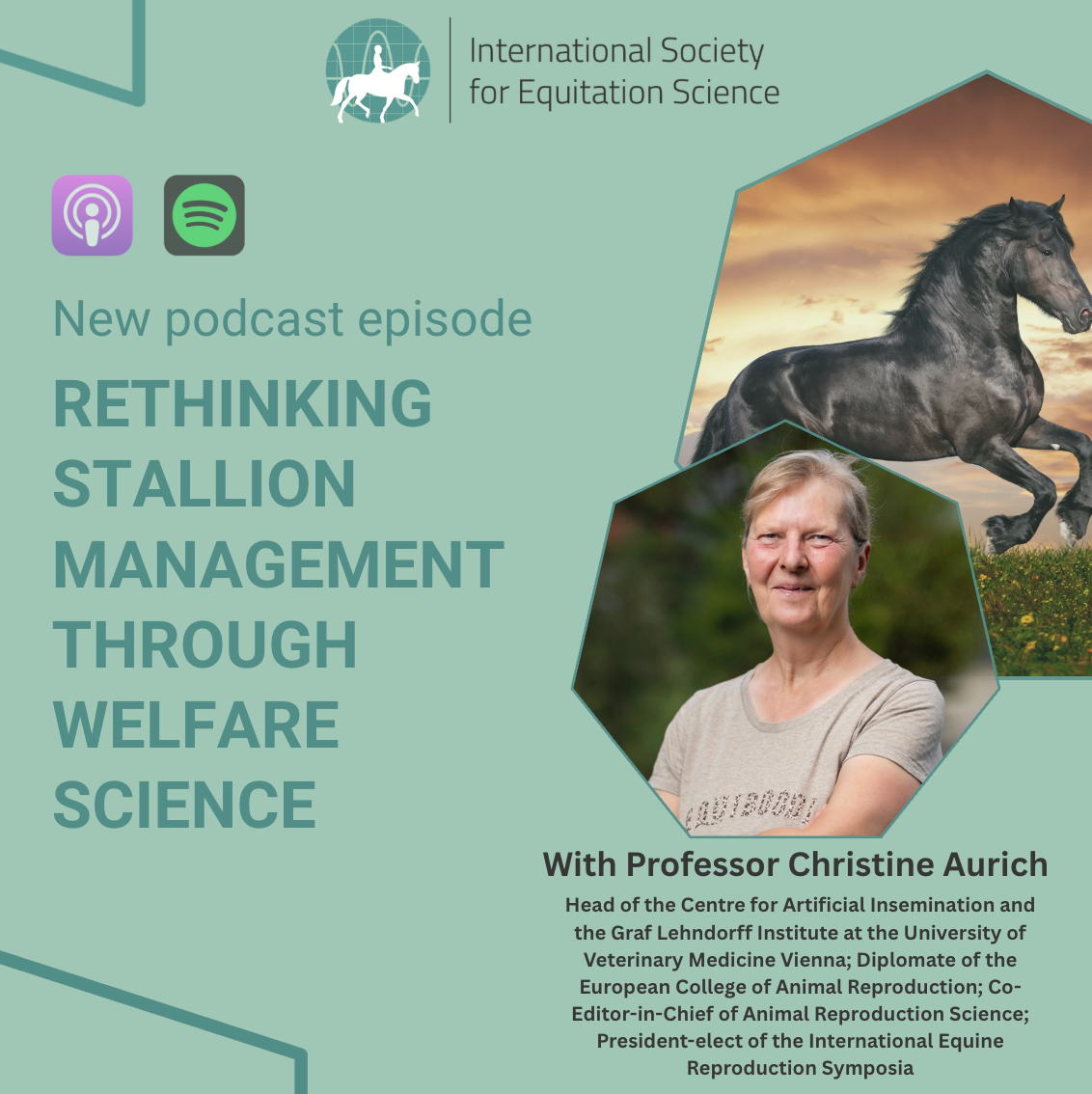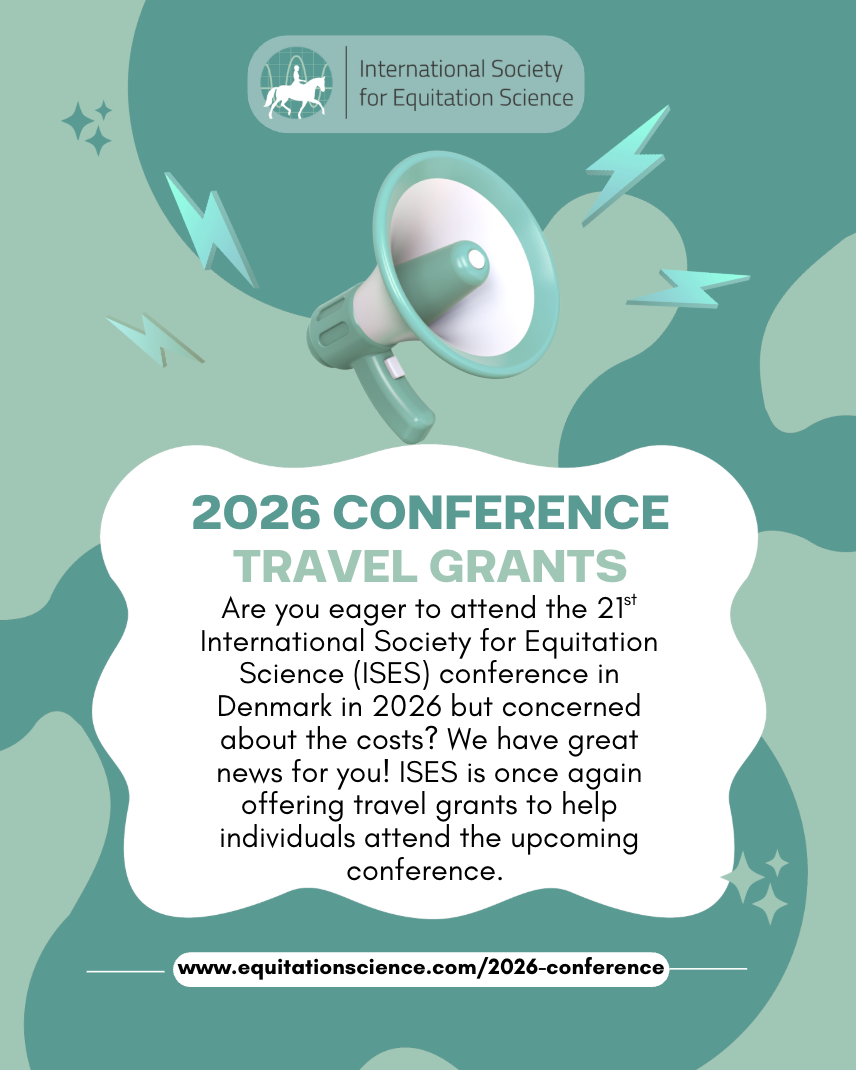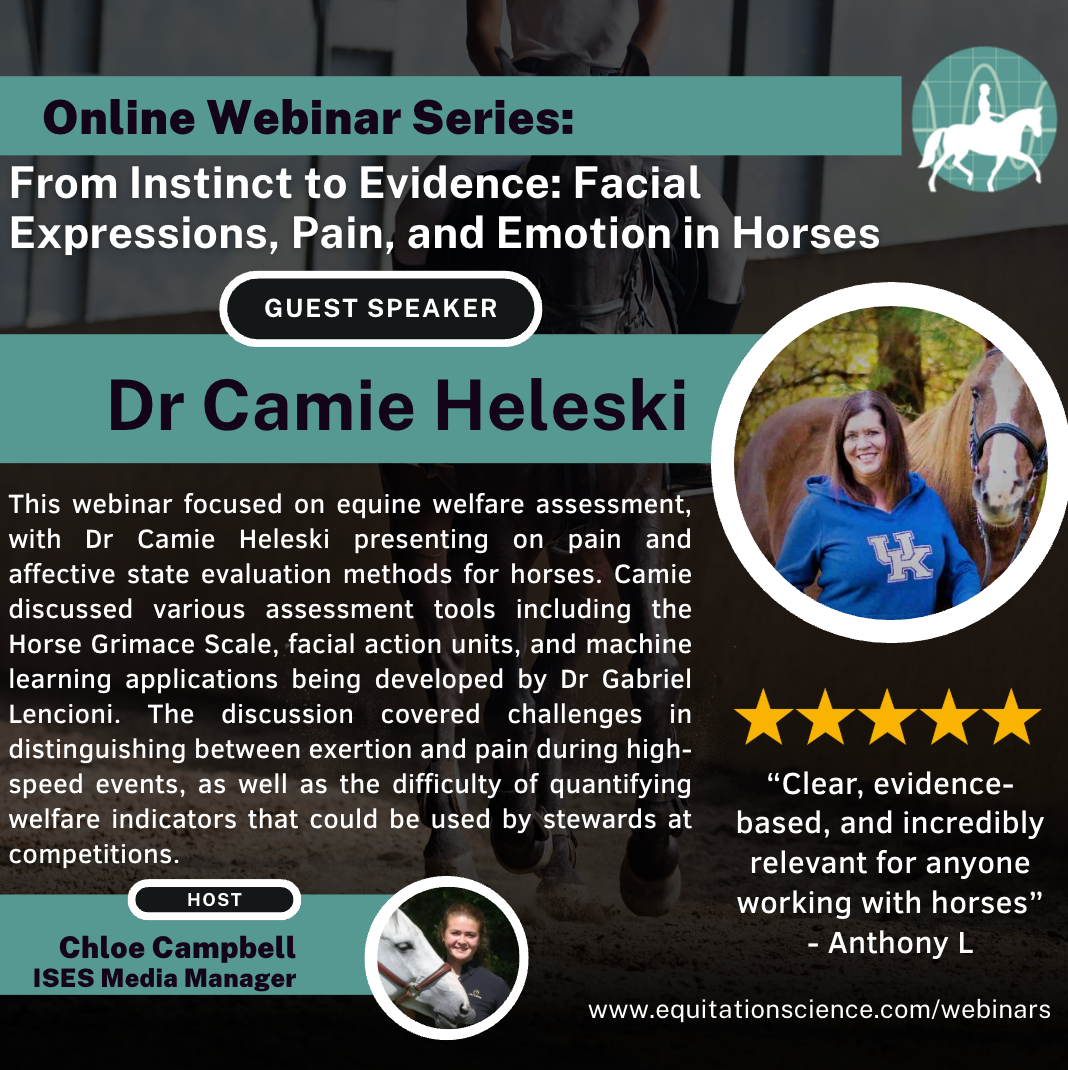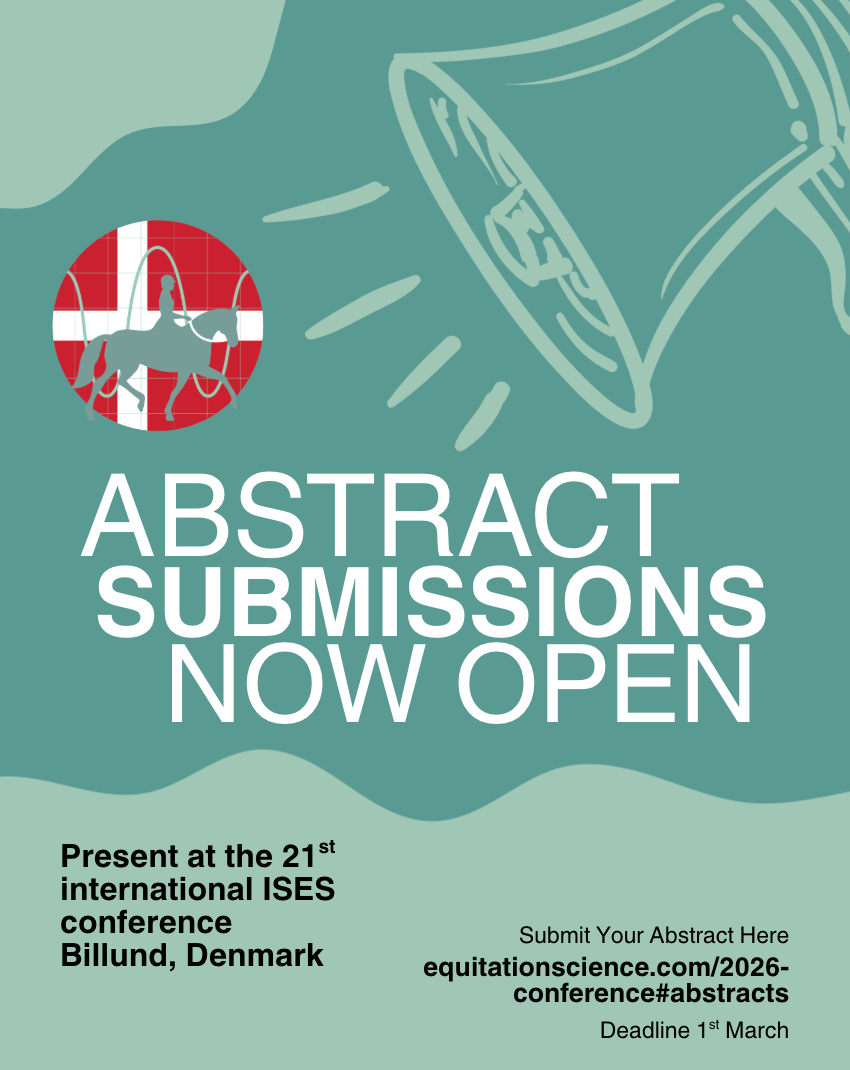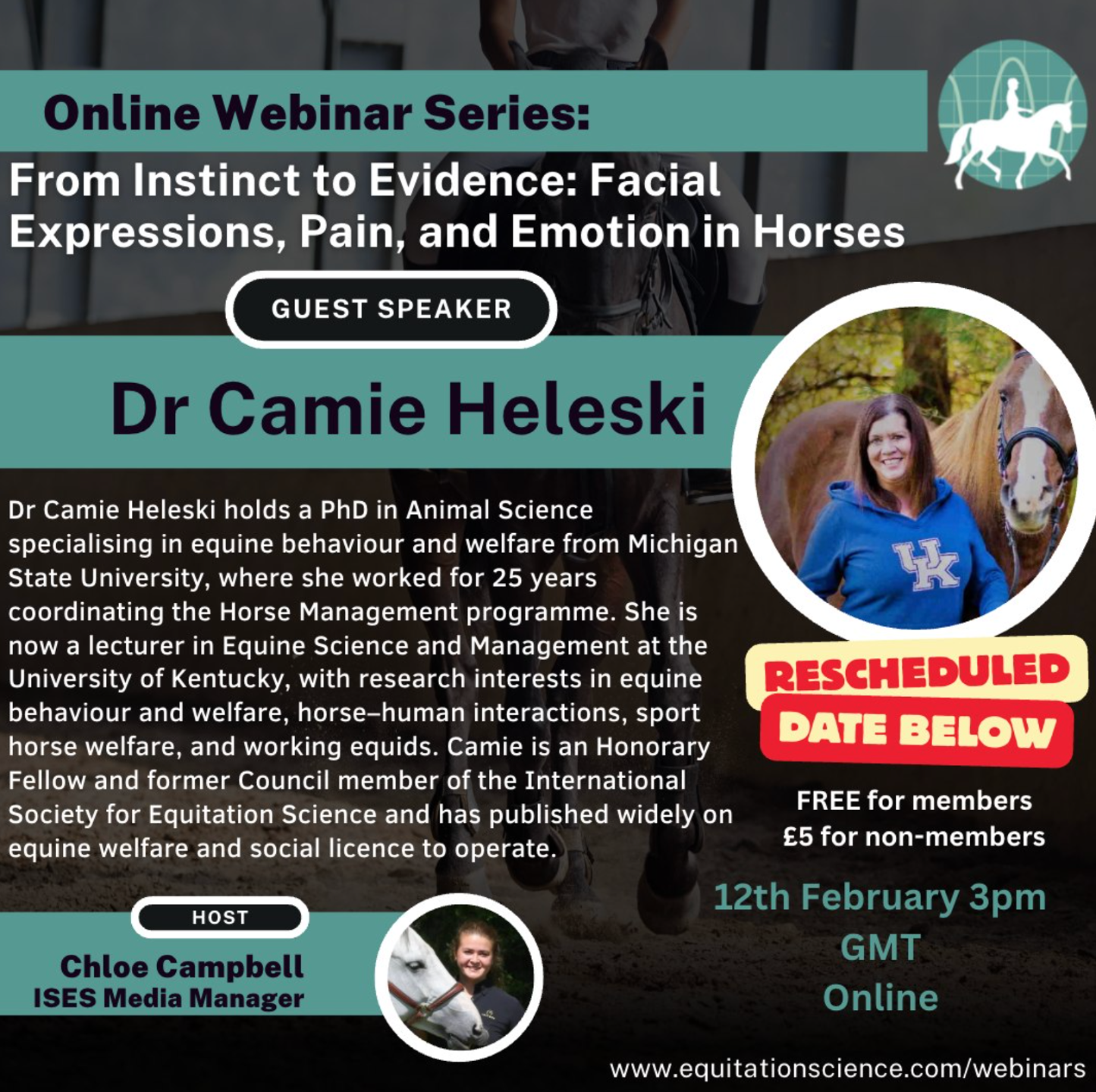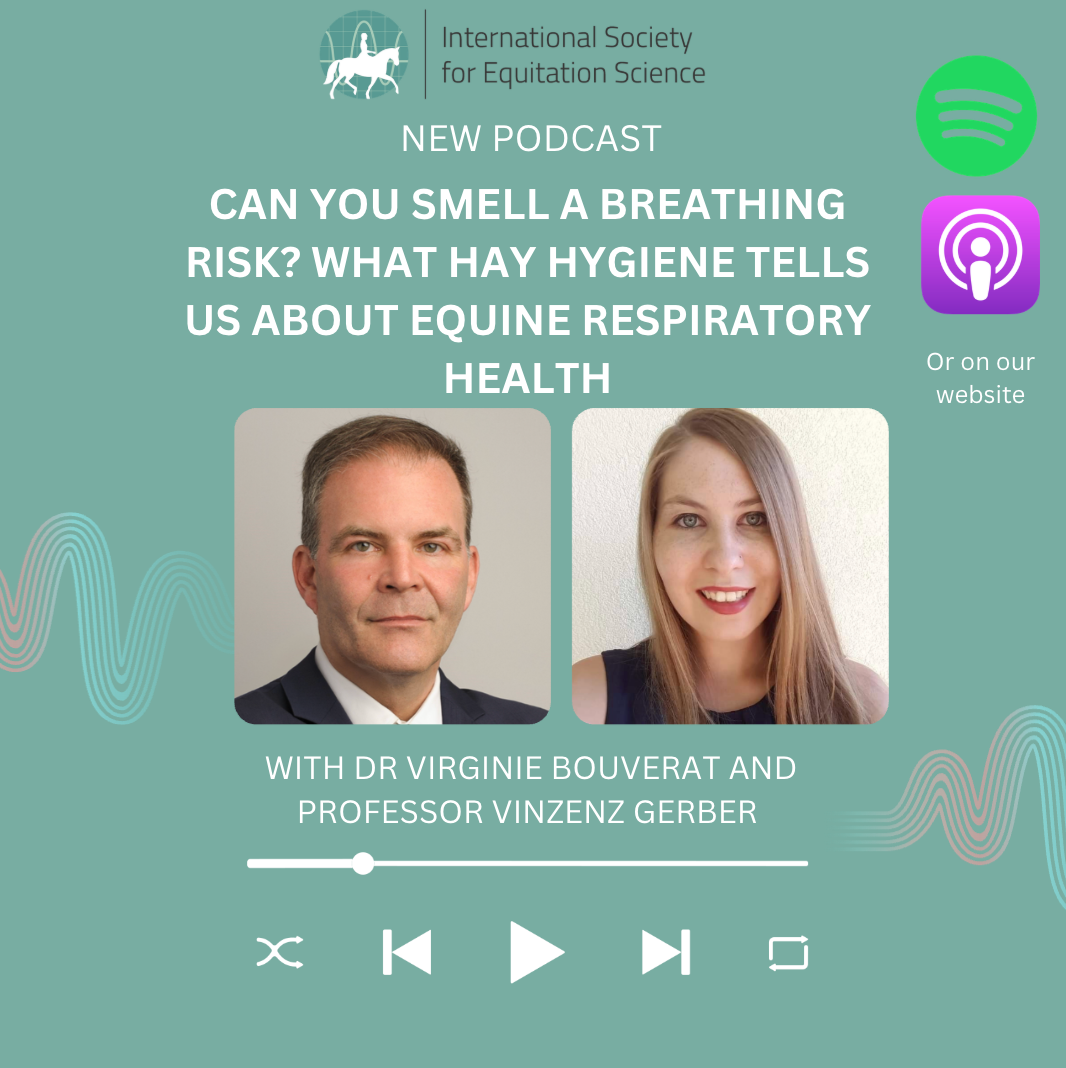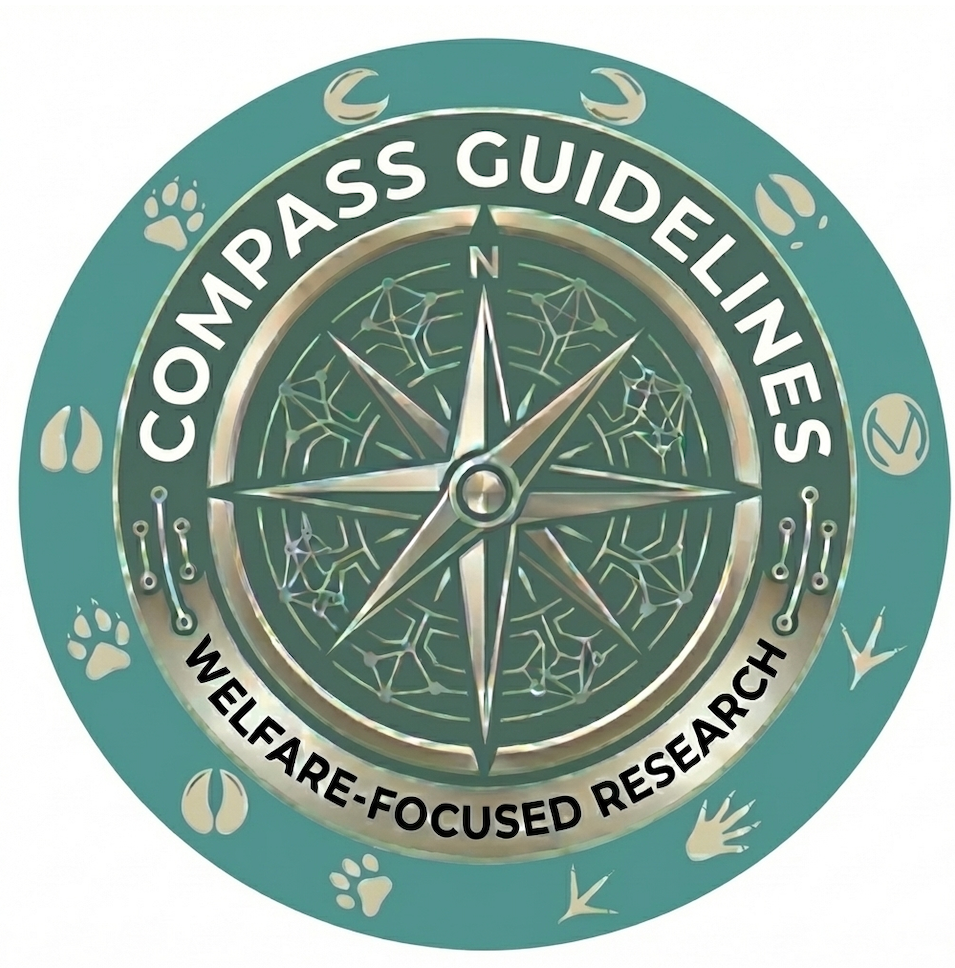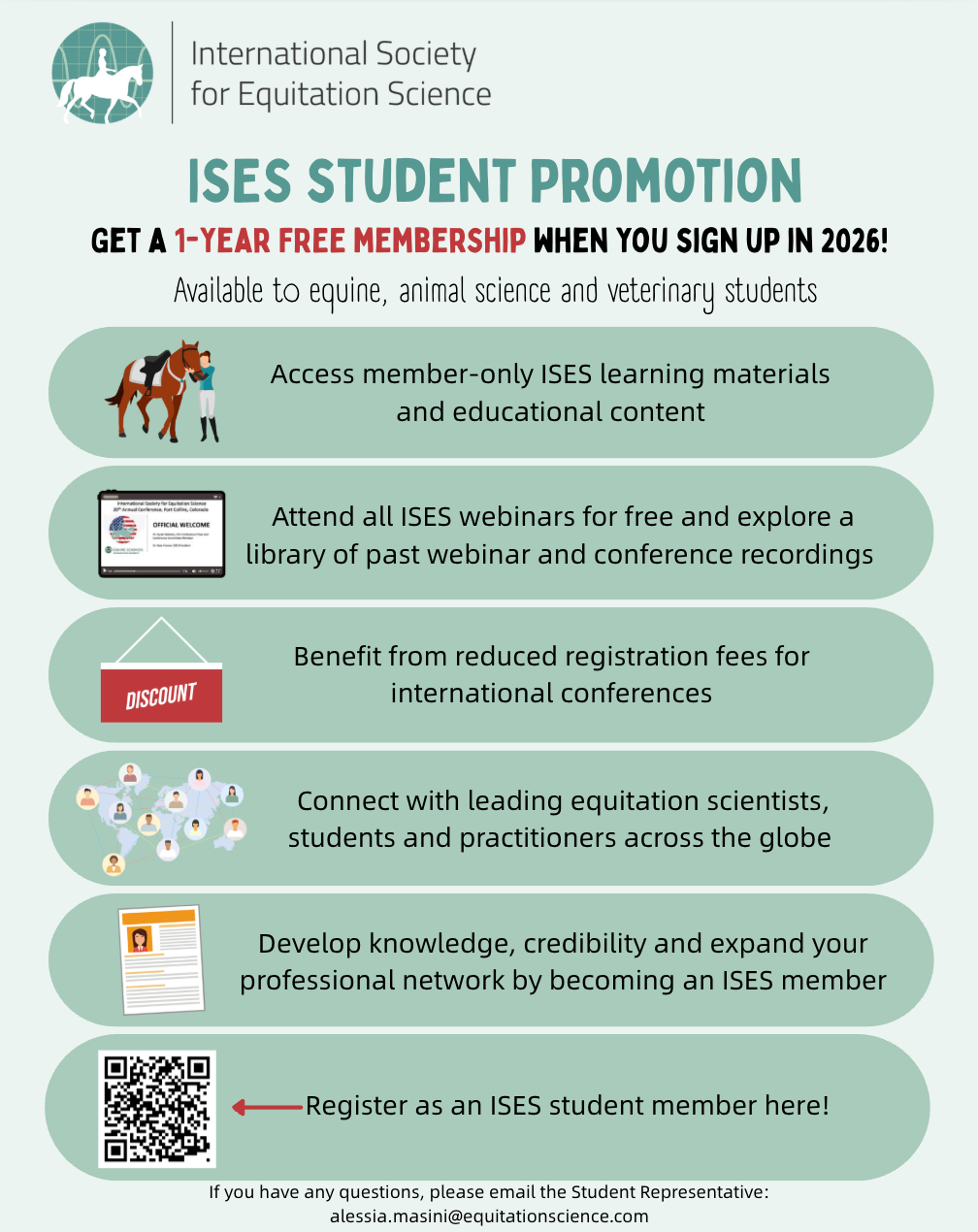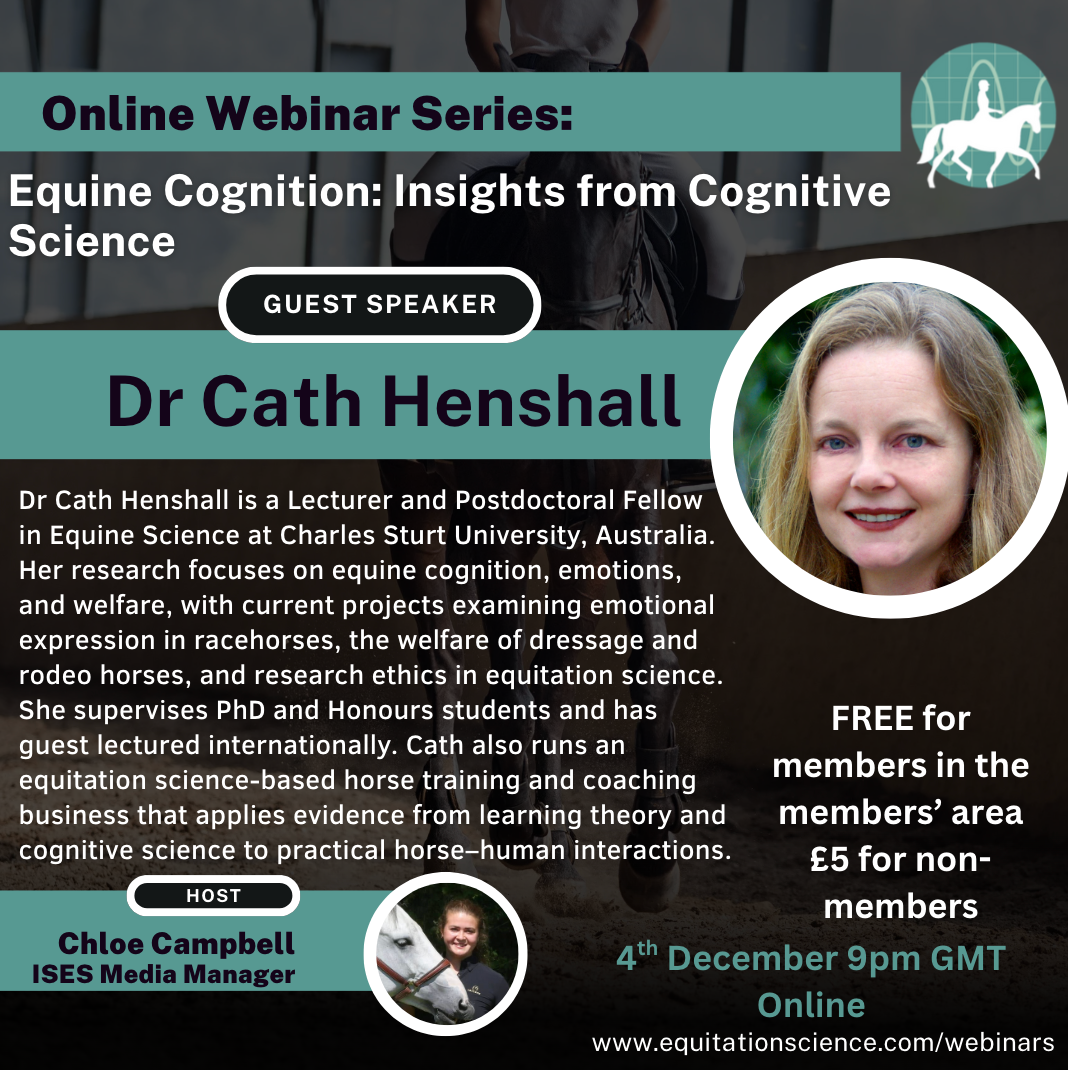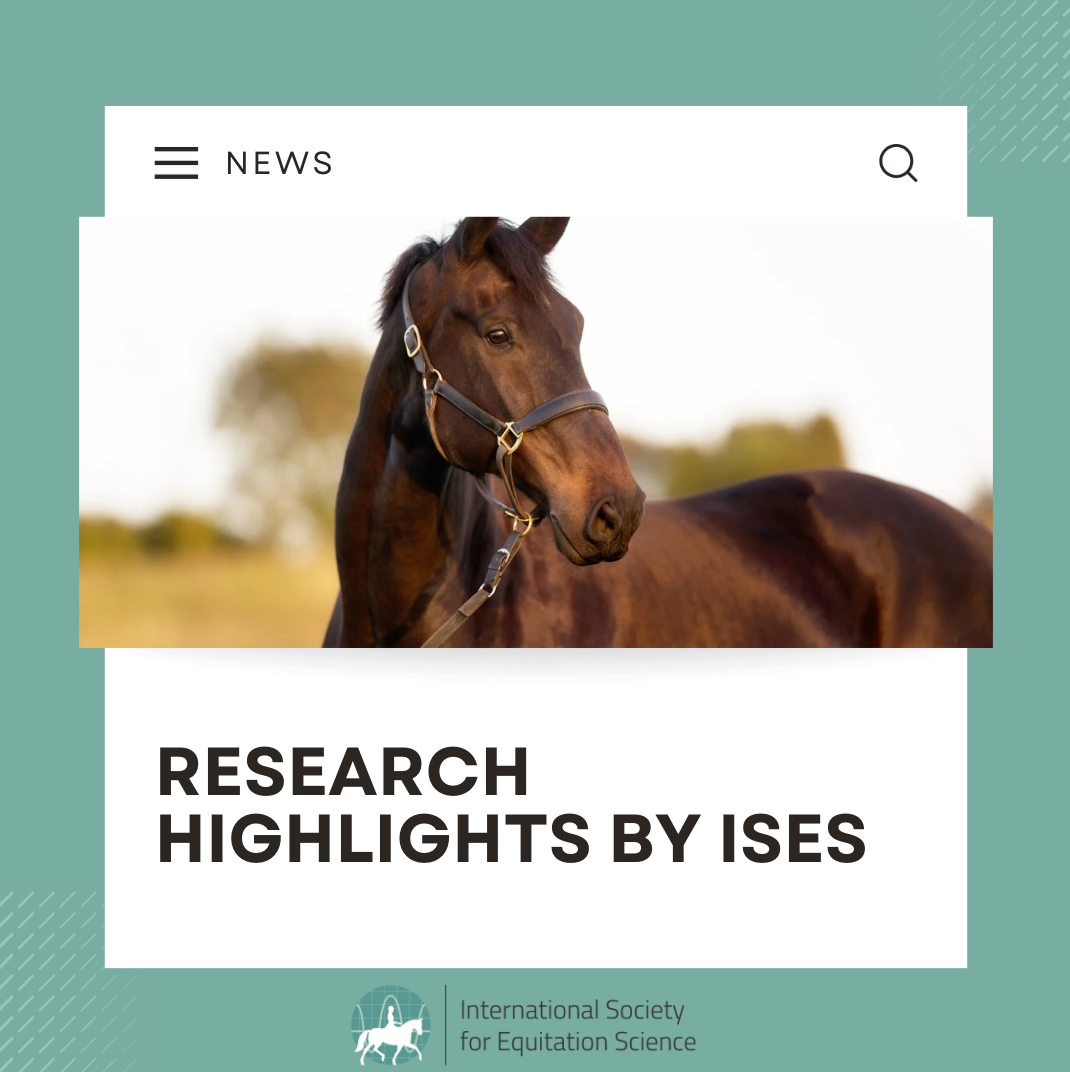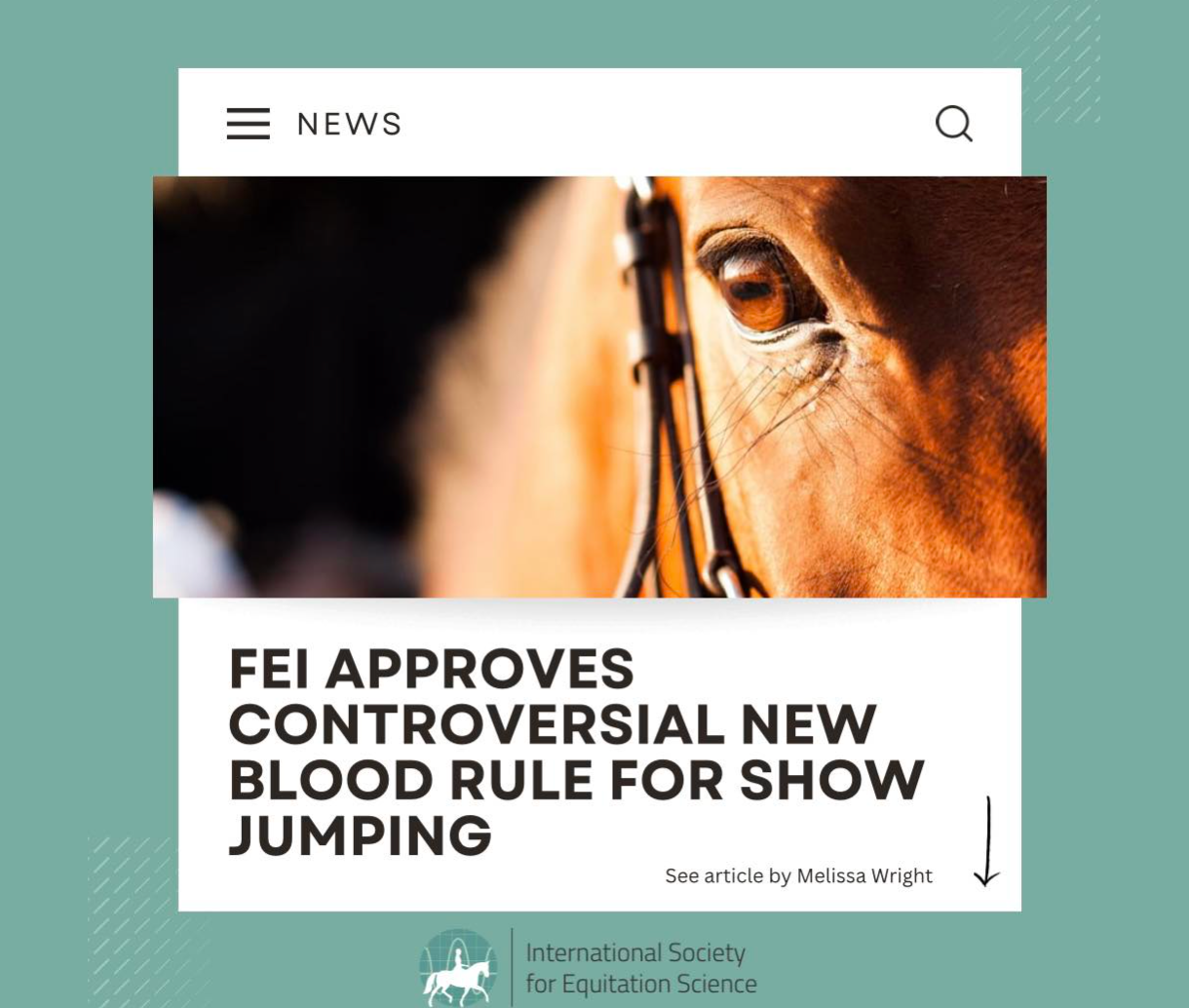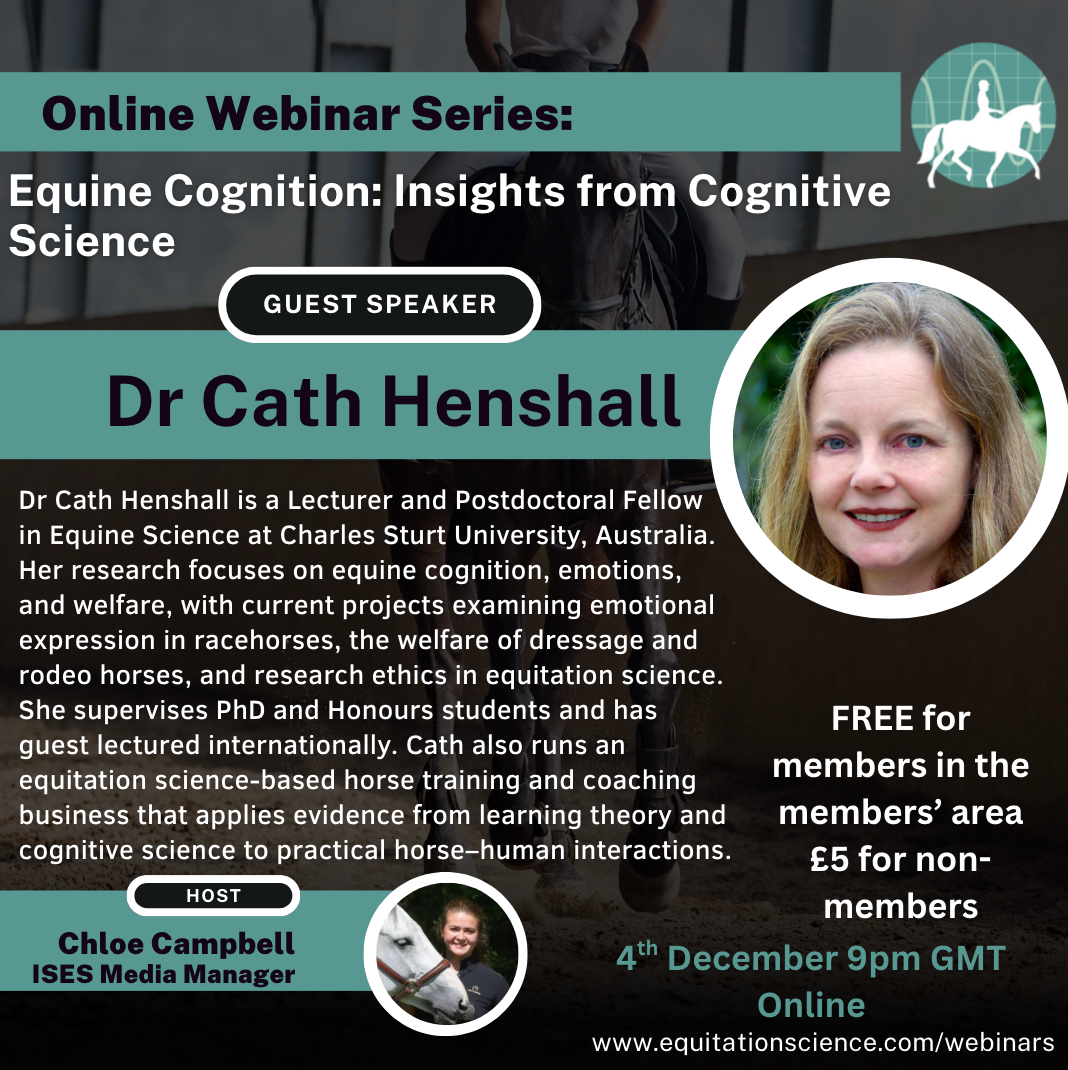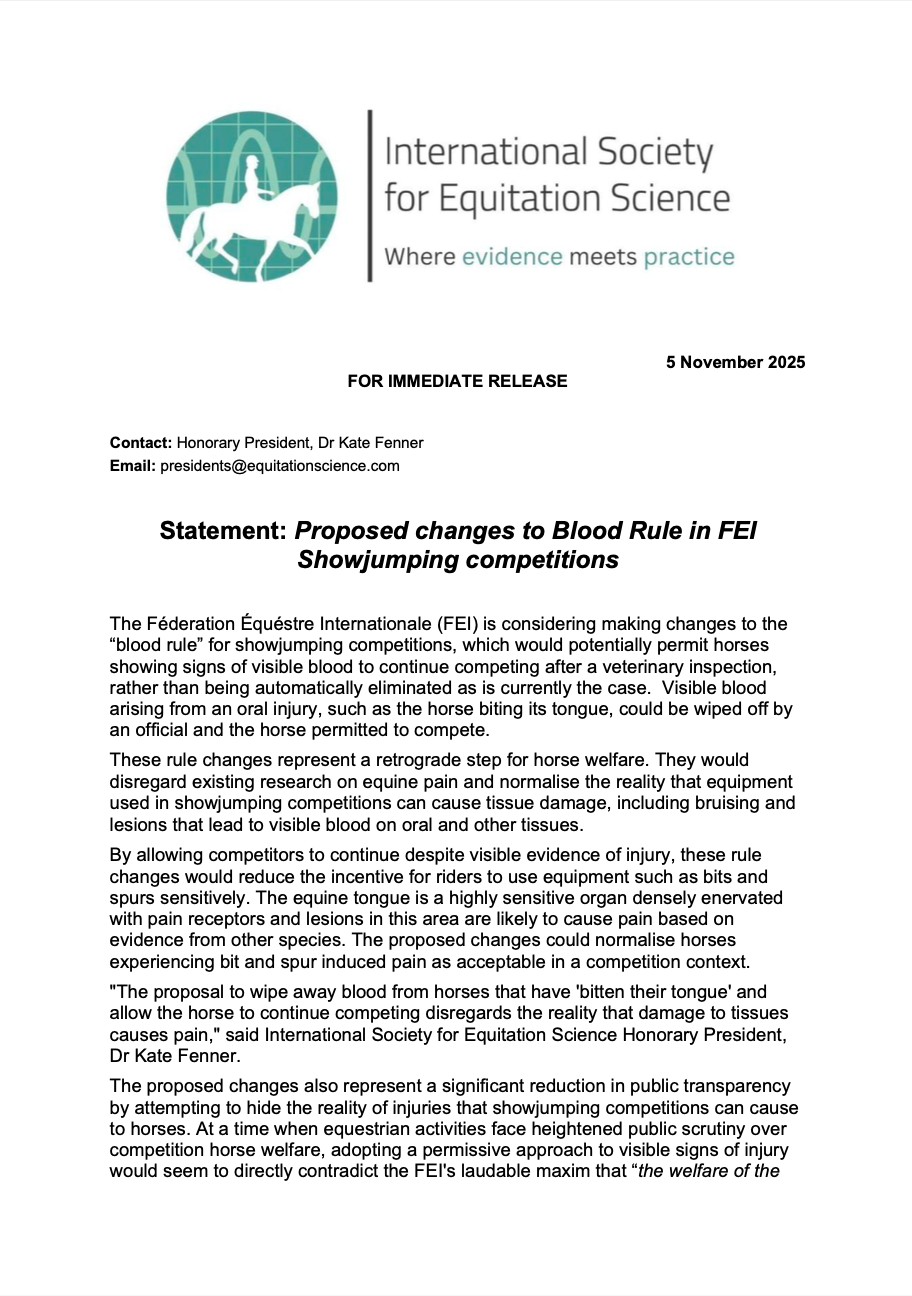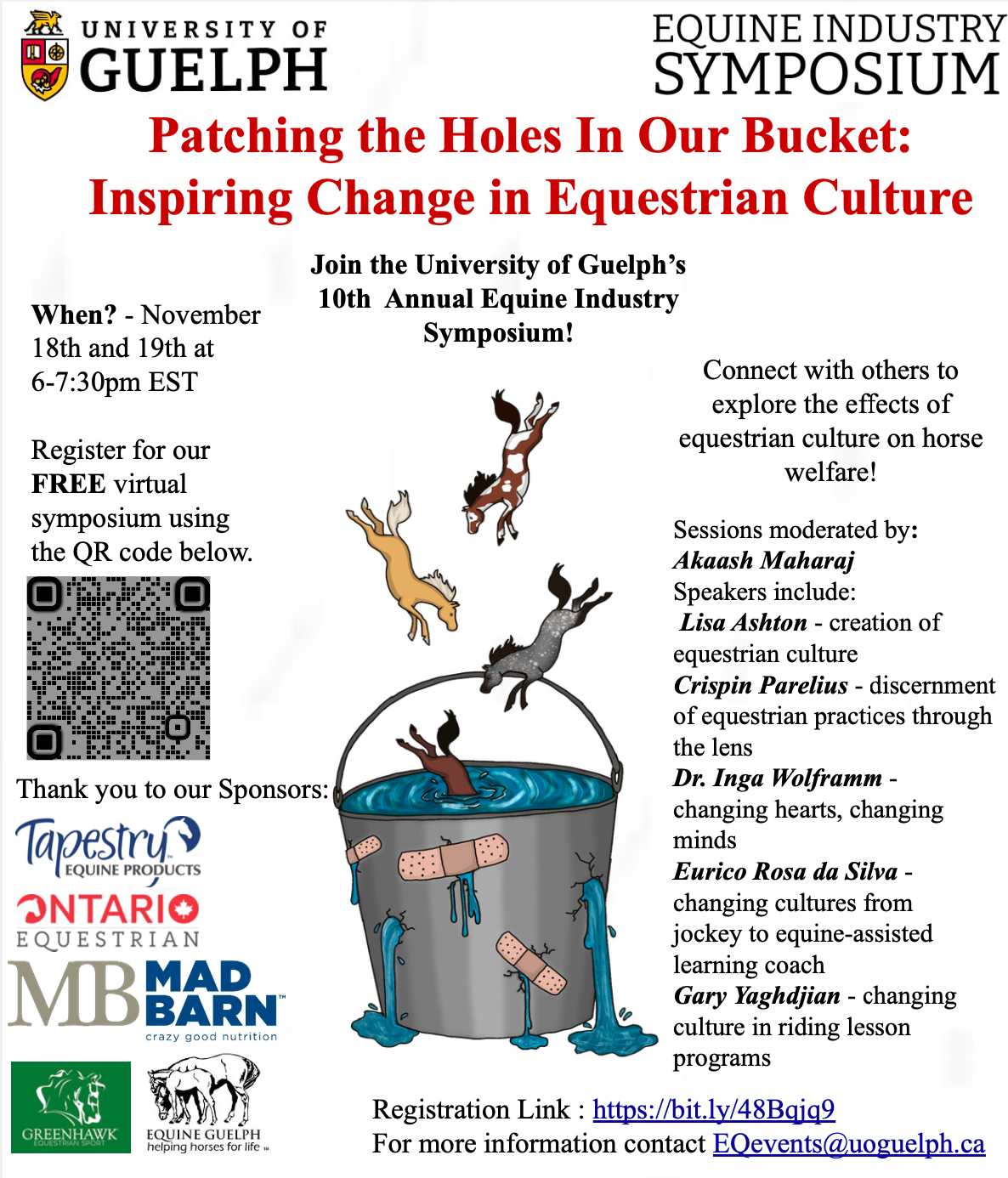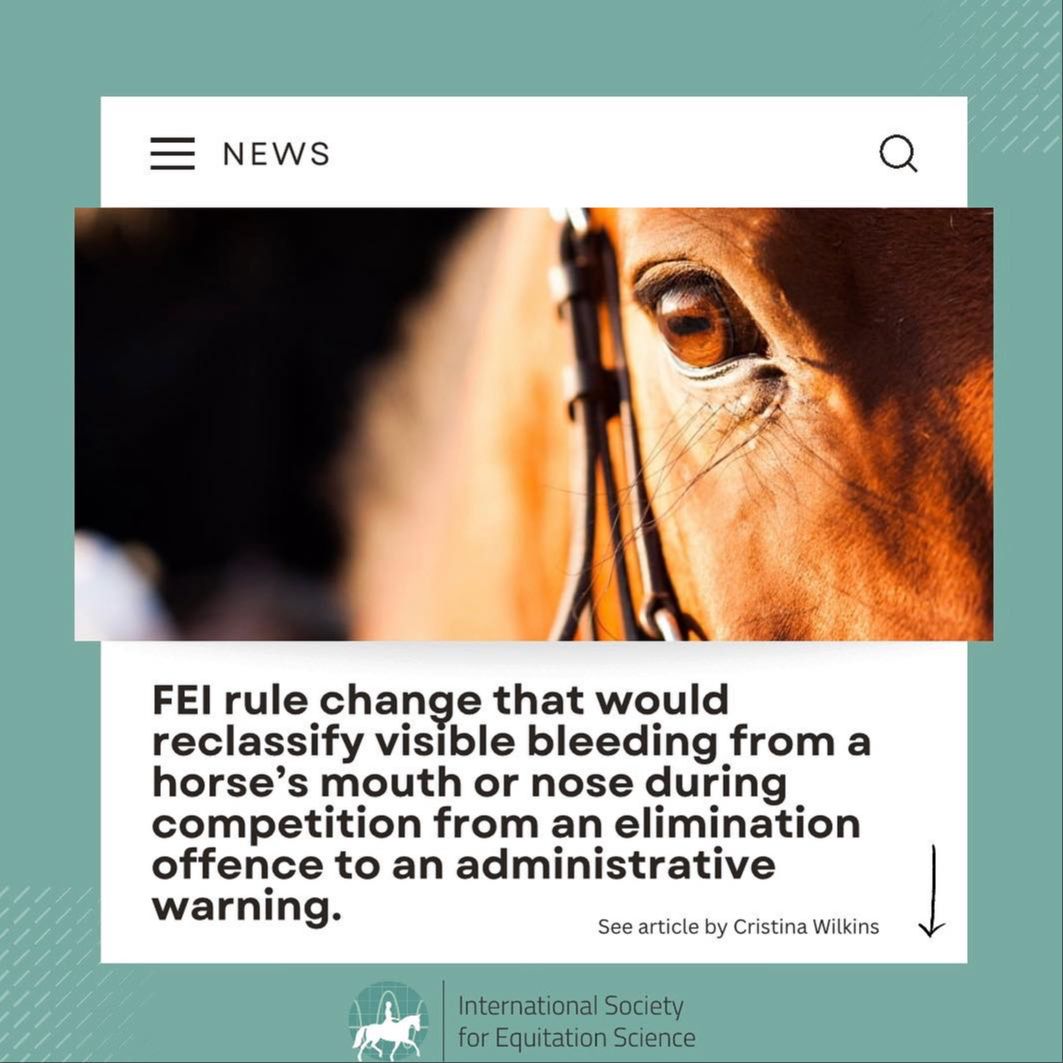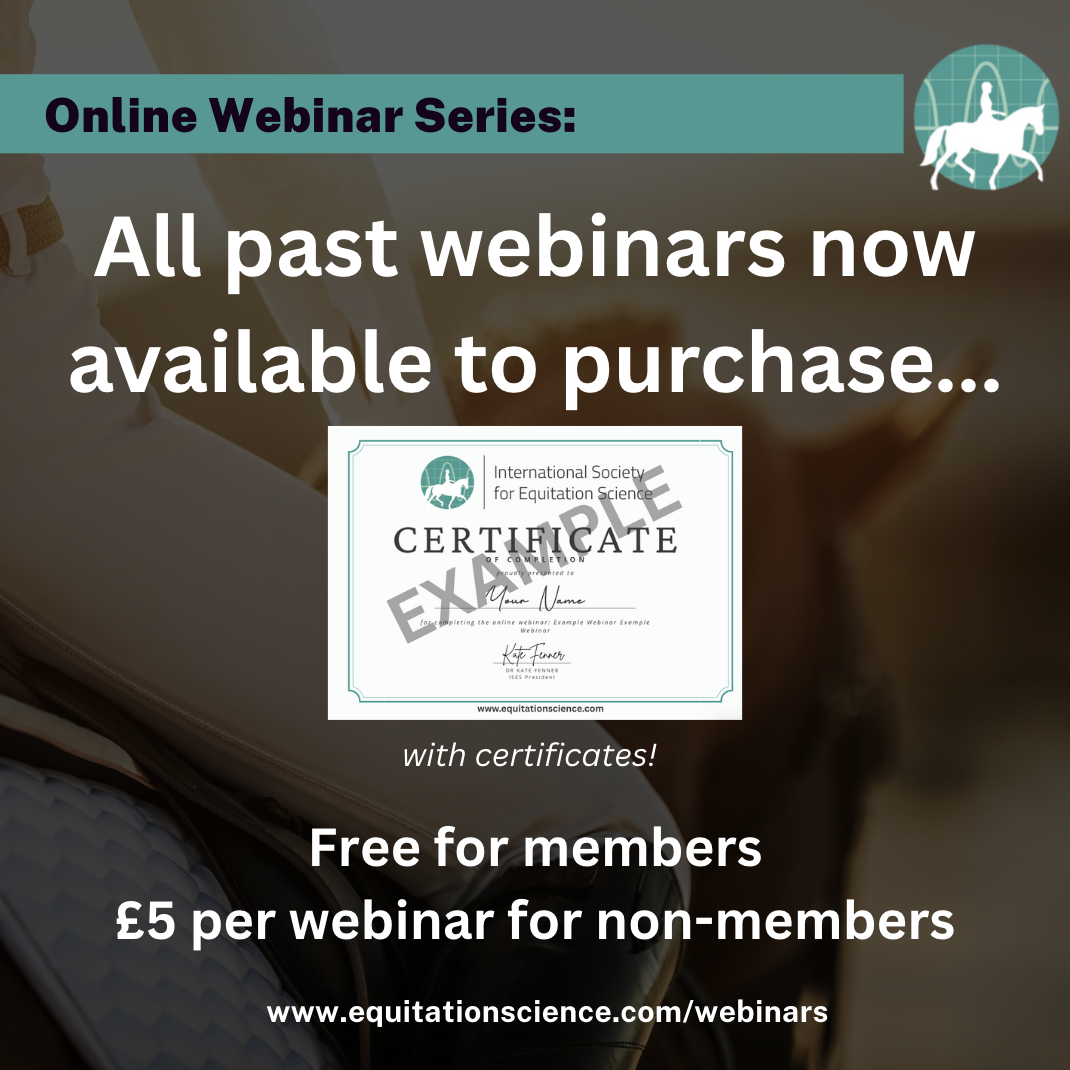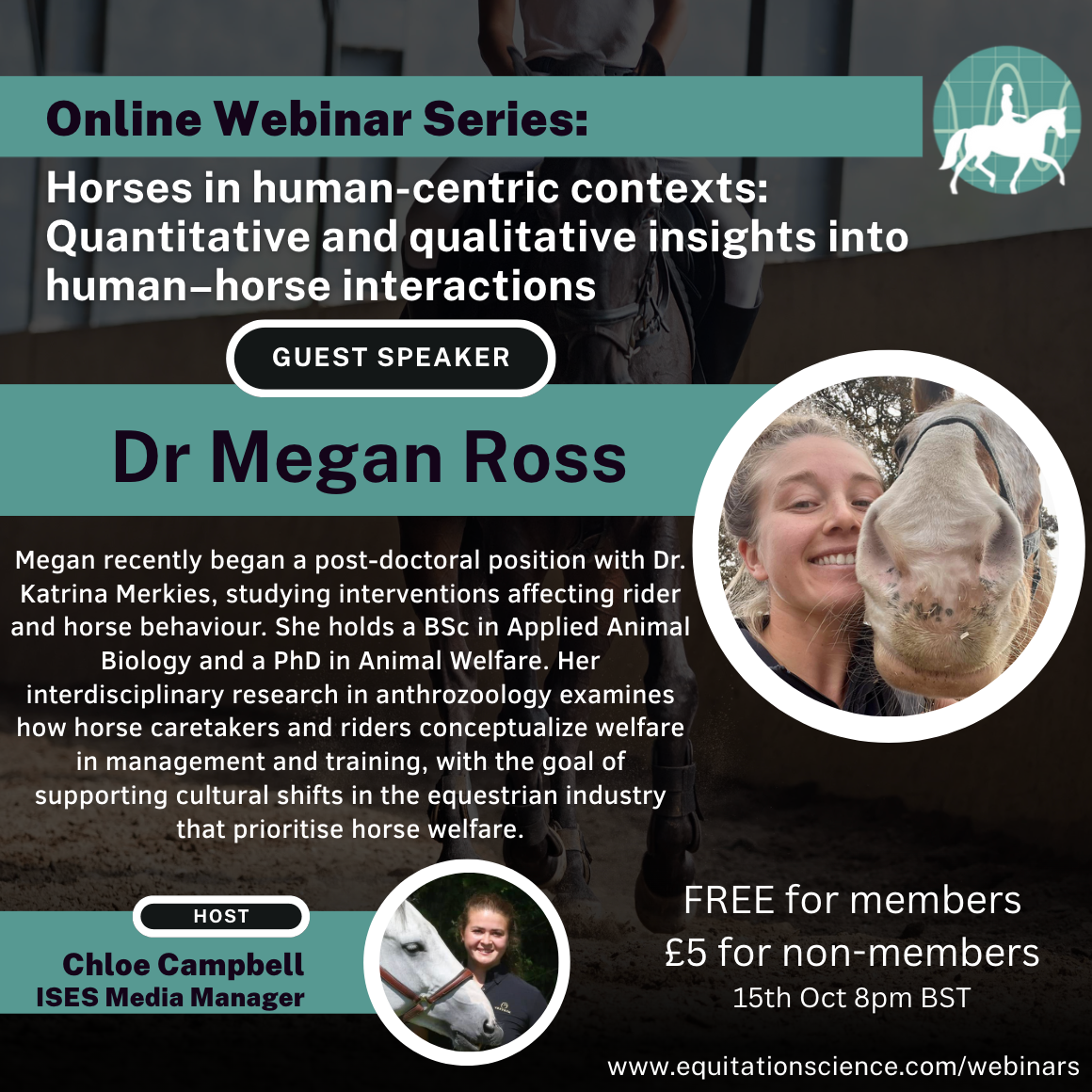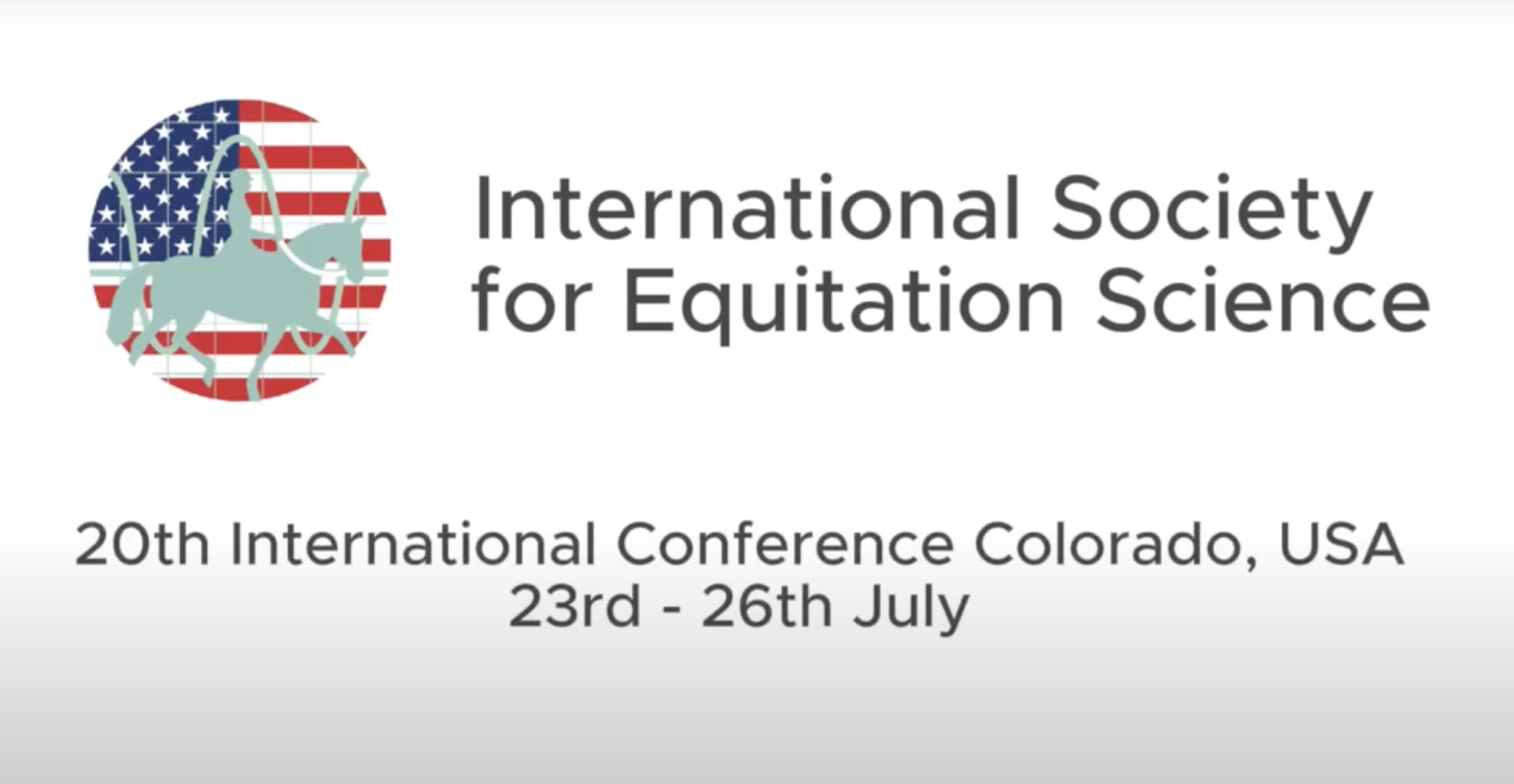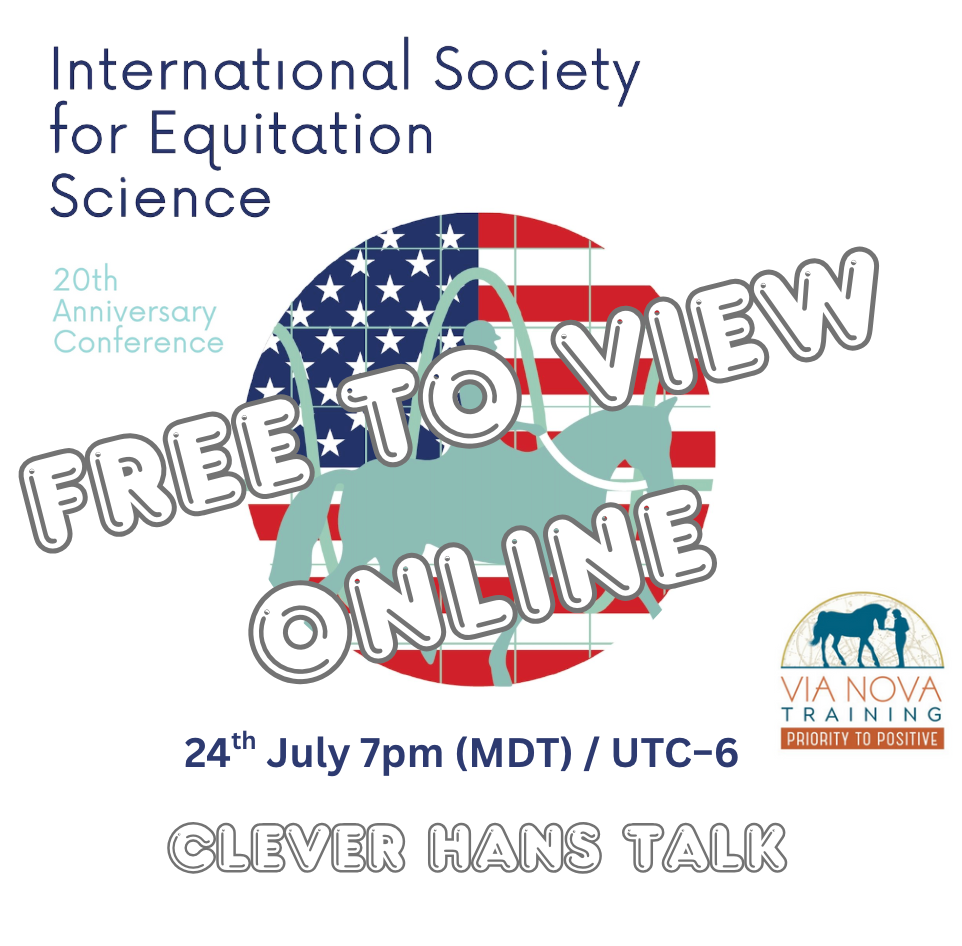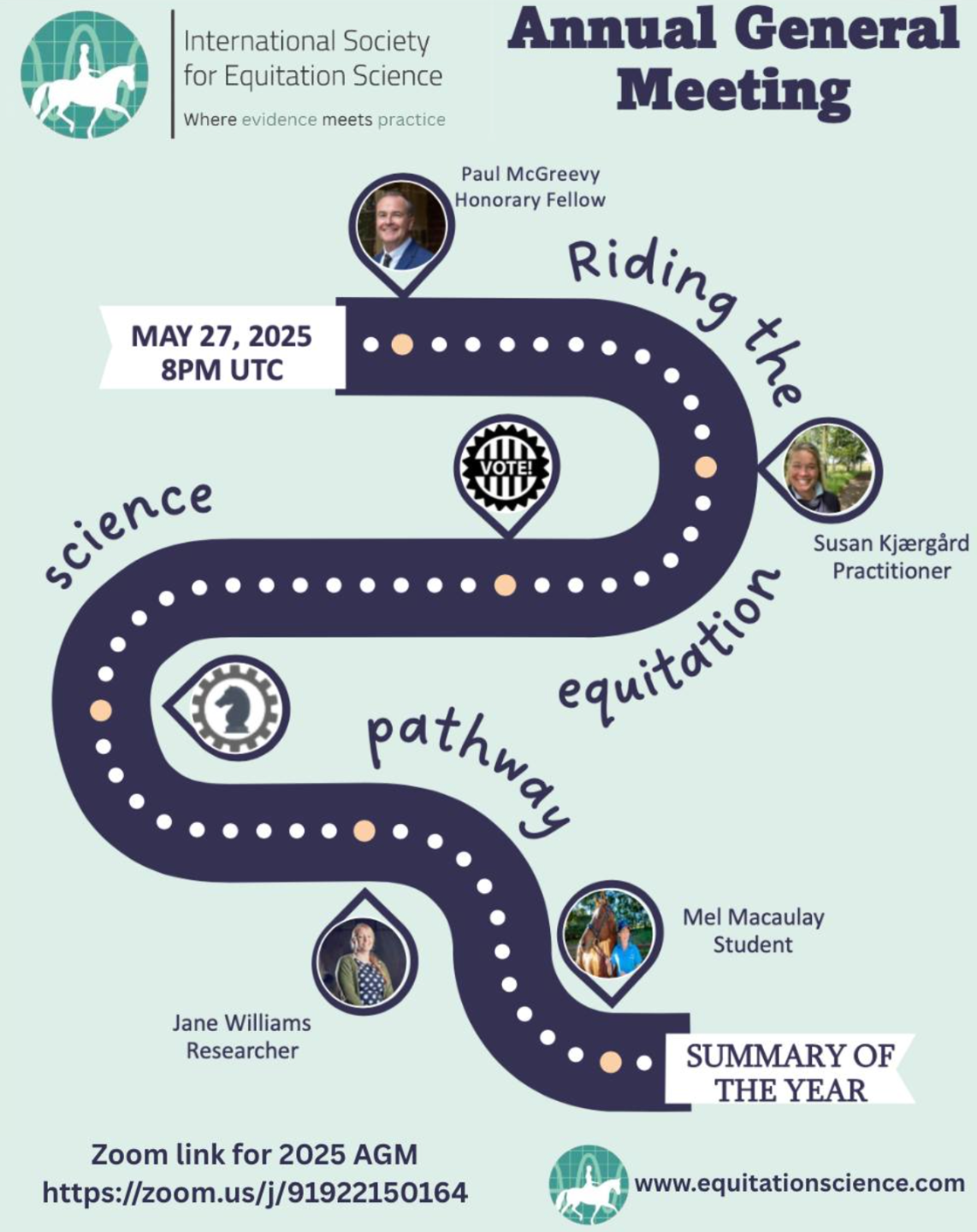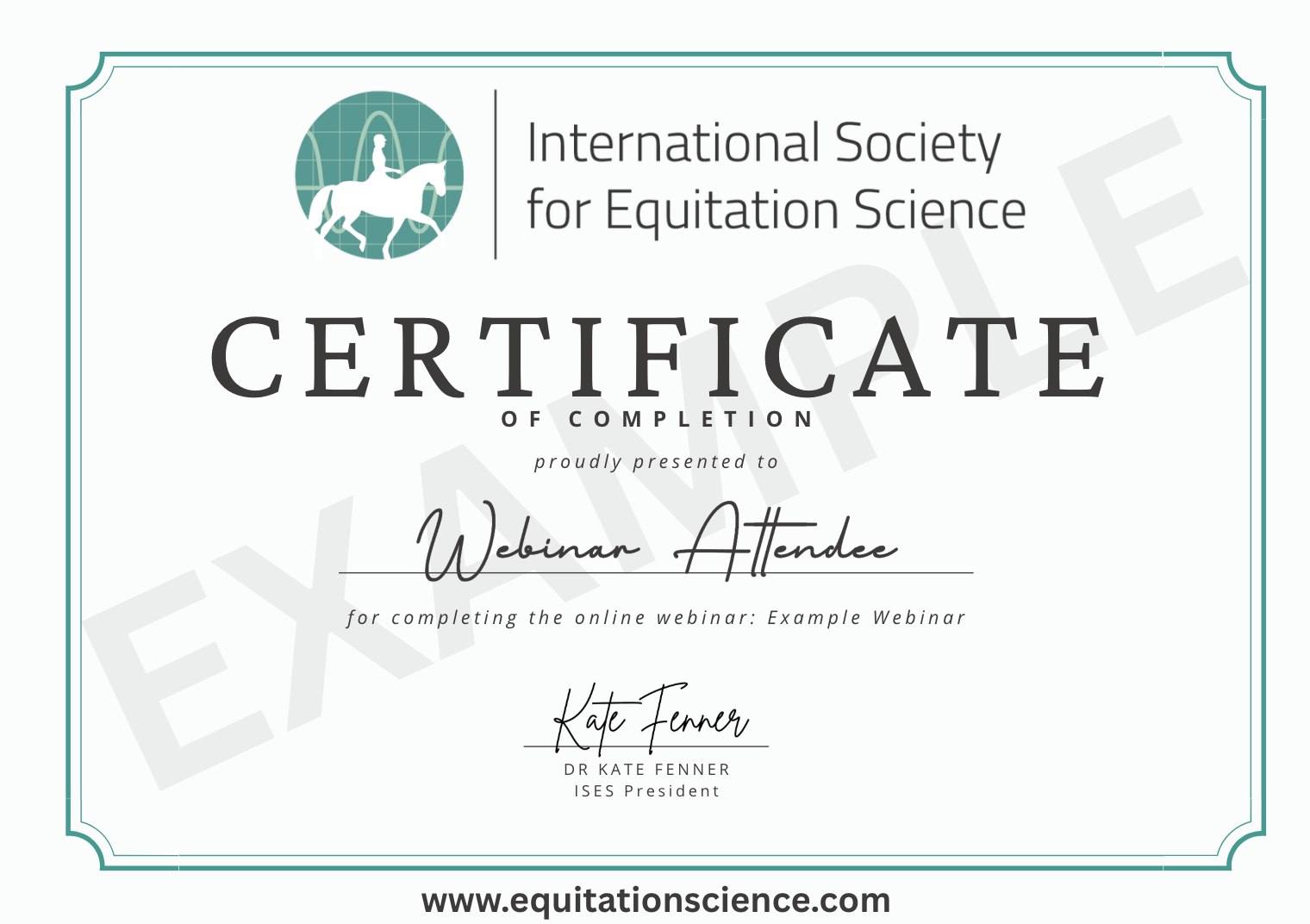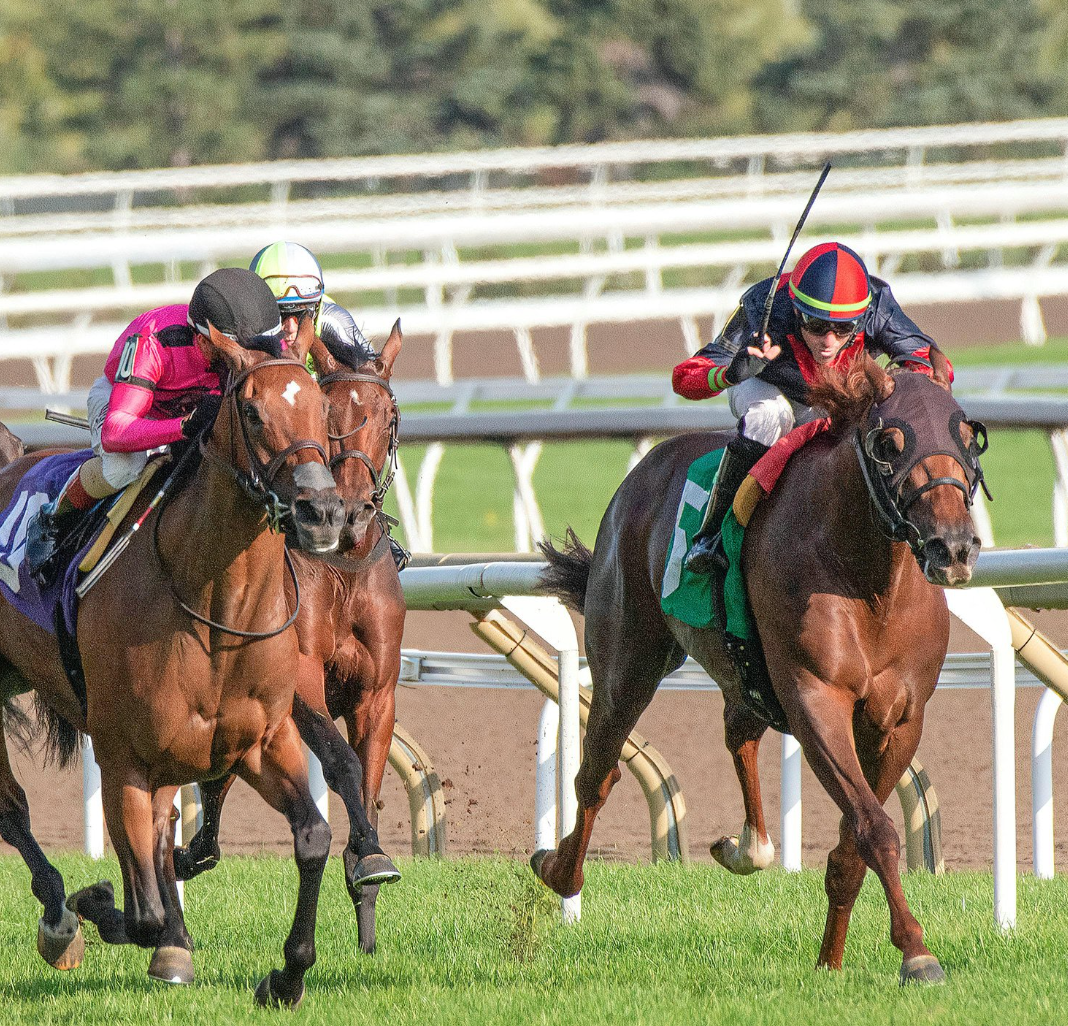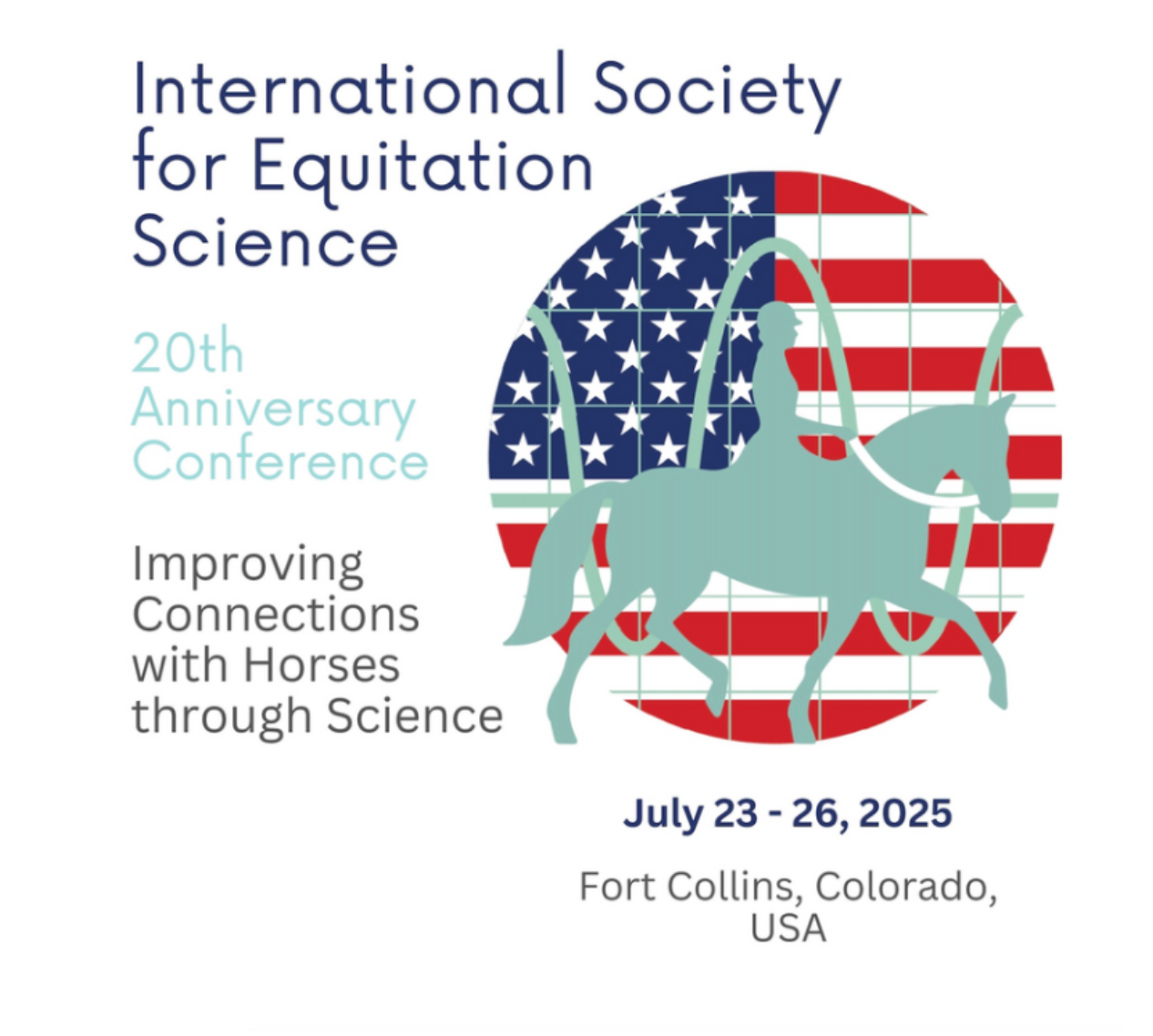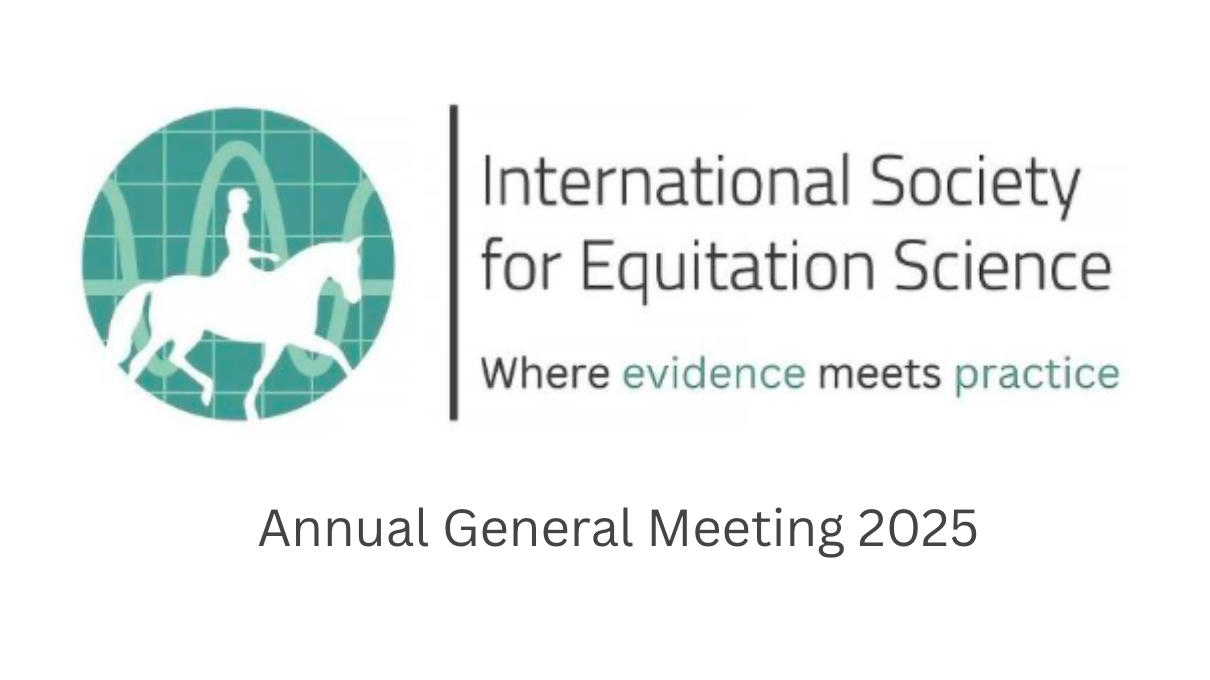The International Society for Equitation Science (ISES) has welcomed the COMPASS Guidelines, a new expert developed framework that strengthens ethical standards, animal welfare protection, and scientific rigour in behaviour modification research by providing clear guidance on study design, welfare assessment, transparency, and ethical decision making, particularly in studies involving horses.
News
New podcast episode: Rethinking Stallion Management Through Welfare Science
Professor Christine Aurich joins us to discuss her review on breeding stallion welfare, exploring how social needs, management practices, and reproductive performance can be balanced to support both wellbeing and productivity.
Listen via Spotify, our website or Apple Podcasts.
Posted 15.02.26
ISES 2026 Conference Travel Grants Now Open
We’re offering three travel grants of up to £1,000 to help members attend the 21st ISES Conference in Billund, Denmark.
Open to:
• Student members
• Practitioner members
• Members from historically underrepresented groups
No abstract submission required.
Apply by 1 April 2026
Posted 12.02.26
Newest Webinar Now Available On-Demand
Our latest webinar, From Instinct to Evidence: Facial Expressions, Pain, and Emotion in Horses with Dr Camie Heleski, is now available to watch on demand.
We’ve already received multiple 5* reviews — including great feedback from our 246 registrants, despite the session taking place only a few hours ago.
Members receive access to all webinars live and on demand as part of their membership — become a member here.
Non-members can purchase recordings here.
Thank you to everyone who joined us live and continues to support evidence-based equitation science through our webinar series.
Posted 12.02.26
21st international conference abstract submissions now open!
Abstract submissions are now officially open for the 21st International ISES Conference in Billund, Denmark! The theme is "The Nature of Horses" and it will be held at LEGOLAND® Conference Centre in Denmark between 11-13 August. This year’s event will bring together researchers, practitioners, and equine professionals to share the latest insights into equitation science, behaviour, and welfare.
Posted 07.02.26
Webinar rescheduled: From Instinct to Evidence: Facial Expressions, Pain, and Emotion in Horses
New date & time: 12th February 2026 3:00 PM (GMT)
Joining link: (same as before — if you registered for the original date/time of the webinar please check your email as we have resent you the information)
Thank you for your understanding and support. We’re looking forward to hosting the full session soon, and we wish Camie a speedy recovery.
If you haven’t registered yet, you can now do so and join us for the rescheduled session by clicking below.
Posted 02.02.26
New podcast episode: Can you smell a breathing risk?
In this episode, we explore how simple sensory checks (sight, touch, and smell) can help flag when hay may release harmful dust or hide microbial contamination, with abnormal odour emerging as a key red flag for respiratory risk. We’re joined by Dr Virginie Bouverat and Professor Vinzenz Gerber, representing the wider research team behind the study, to discuss what these findings mean for practical, low-cost stable management.
Listen on Spotify, Apple Podcasts or...
Posted 23.01.26
COMPASS Guidelines now released
Posted 10.01.26
Students get free membership with ISES throughout 2026!
For the first time ever, we’re offering a 1-year free student membership for 2026.
Posted 31.12.25
Another new webinar available to watch on demand
Another webinar in the ISES Exploring Equitation Science series is now available to watch. Dr Cathrynne Henshall covers equine cognition and neuroscience in this two-hour webinar, which is free for ISES members or available to non-members for just £5, offering in-depth insight into equine cognition, emotion, and learning.
Posted 06.12.25
Research highlights
This Research Highlights page will be updated regularly, featuring recent studies handpicked by the ISES Council. The aim is to showcase emerging research in equitation science that informs best practice in training, management, and horse welfare.
Posted 15.11.25
FEI Approves Controversial New Blood Rule for Show Jumping
During the 2025 FEI General Assembly in Hong Kong, the Fédération Equestre Internationale (FEI) voted 56–20, with two abstentions, to approve a controversial amendment to the show jumping rules known as the “blood rule.”
Posted 10.11.25
Read moreNew webinar alert
Join Dr Cath Henshall as she explores how horses think, learn, and make decisions, and what this means for training, problem-solving, and welfare. This webinar connects cognitive science with practical equine applications.
Posted 06.11.25
Register nowOfficial ISES Statement
The International Society for Equitation Science (ISES) has released a statement regarding the proposed changes to the FEI Blood Rule in Showjumping competitions.
Posted 05.11.25
See full statementJoin the 10th Annual Equine Industry Symposium
This year’s theme — “Patching the Holes in Our Bucket: Building a Stronger Equestrian Culture” — explores how compassion, connection, and sustainability can shape a more positive future for the equine community.
Posted 01.11.25
The FEI plans to vote this November on a rule change that would downgrade visible blood from a horse’s mouth or nose from an automatic elimination to a Recorded Warning
Posted 22.10.25
Watch all webinars on catch up - now available
Missed a live session? You can now catch up on our complete webinar recordings and learn at your own pace. Members: Already have full access — just log in and start watching today. Non-members: Webinars are available to purchase individually for just £5 each.
Posted 01.10.25
Next webinar announcement
Horses in human-centric contexts: Quantitative and qualitative insights into human–horse interactions — Communication and understanding. Developing a relationship. Join us as we explore how communication and relationship-building shape human–horse interactions, drawing on both research and real-world insights.
Posted 30.09.25
Watch or listen to the 2025 conference interviews, includes Clever Hans talk
Relive the highlights of the 20th Anniversary International Society for Equitation Science (ISES) Conference, held at Colorado State University in Fort Collins, Colorado. Across four days, leading researchers, practitioners, and equestrian professionals gathered to share the latest science on horse–human interactions, training practices, welfare, and technology.
Podcast versions will be uploaded over the next 2 months starting from 10th Sept. Listen on our website or Spotify.
New podcast episode and YouTube video with Dr Katherine Houpt
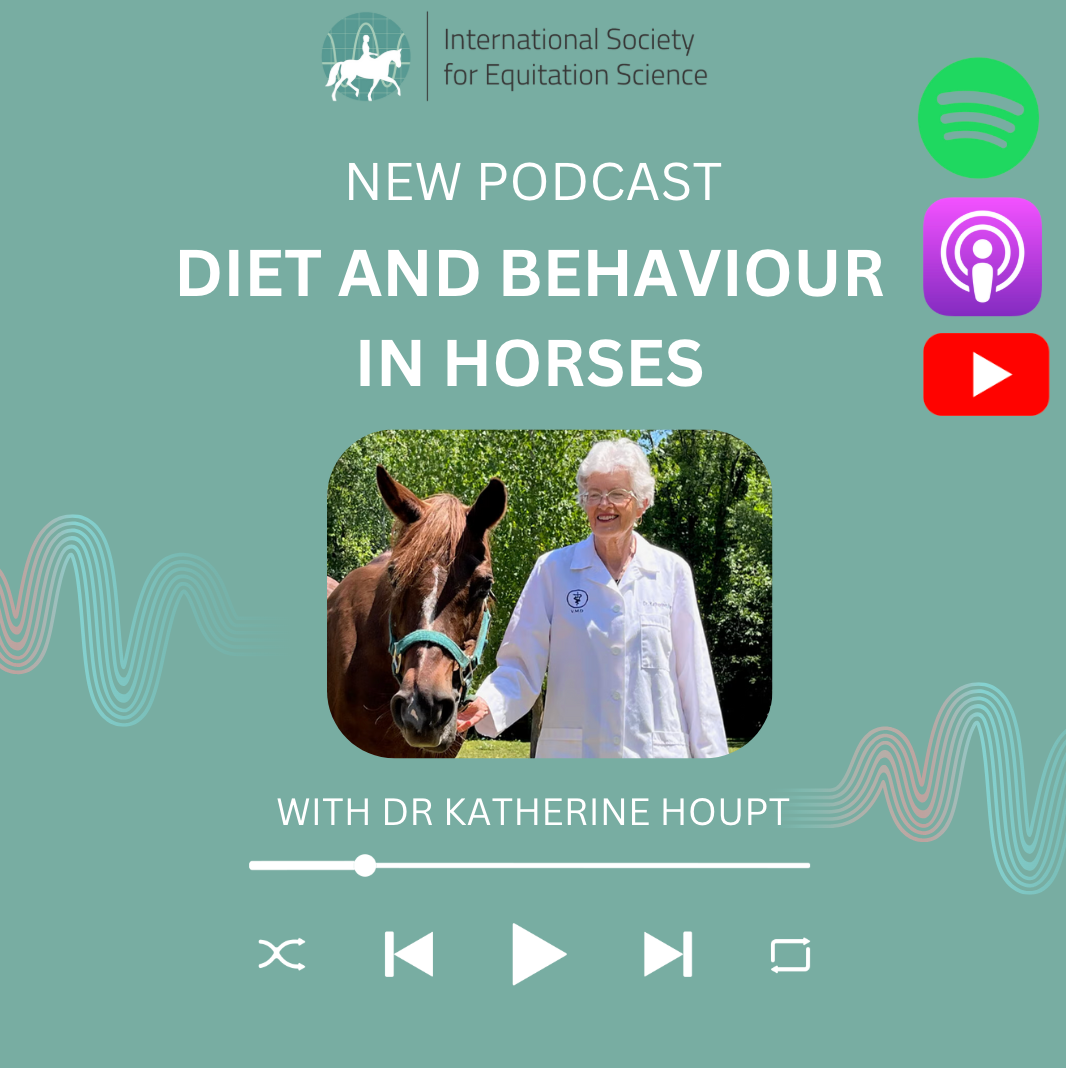
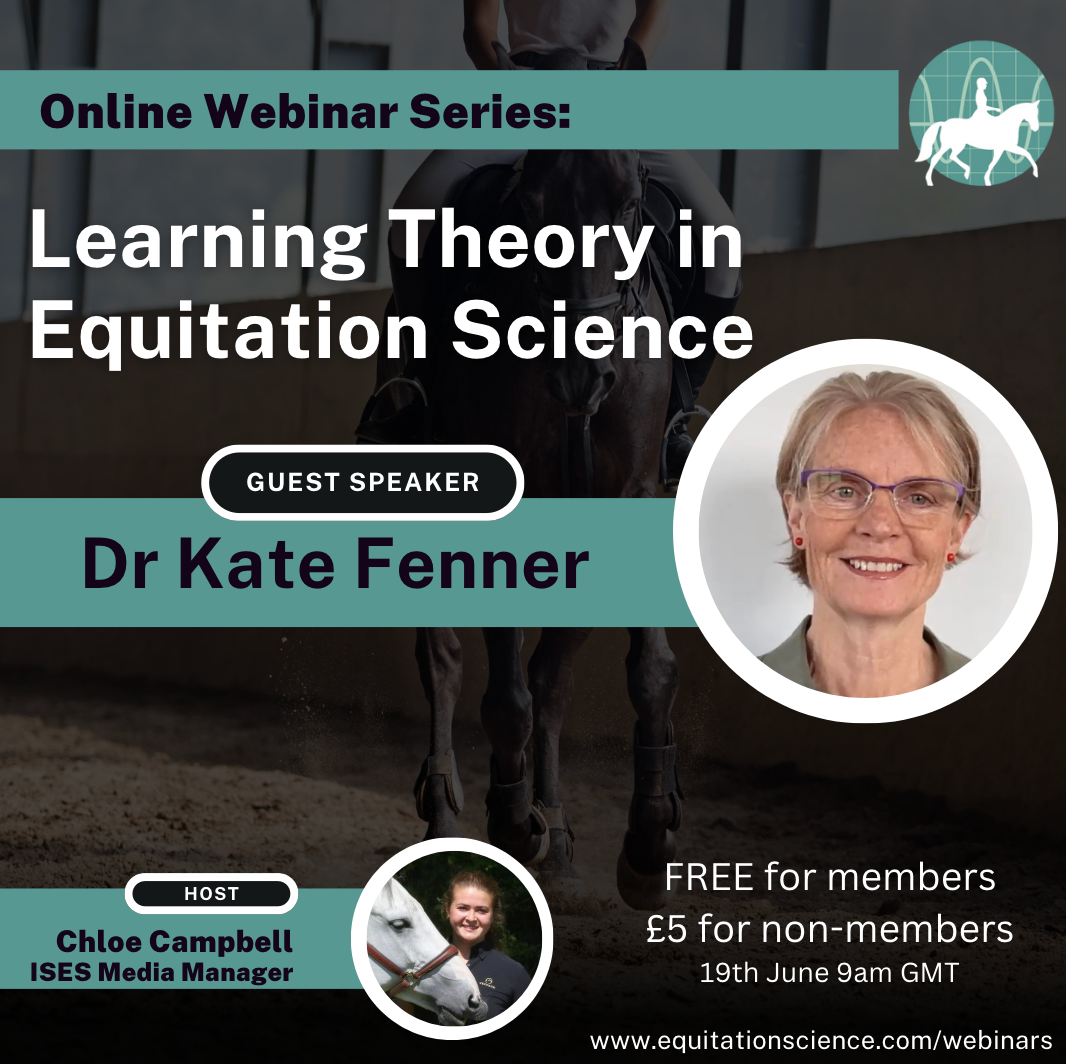
A Tasmanian court has ruled that using a padded racing whip on a horse can cause unreasonable and unjustifiable pain, making it an act of animal cruelty under the law.
2025 Council Elections
Voting has now commenced for the election of new members to the ISES Council. If you hold an Academic membership you are eligible to vote. We encourage all eligible voters to have your say on who should join Council in 2025. There’s a range of highly qualified new and familiar faces who have volunteered their time and expertise to service on Council to fulfil our mission of sharing equitation science to safeguard horse welfare across the equestrian community.
Voting will continue online until 26 May. For more information about the candidates and to place your vote please click here: https://www.equitationscience.com/2025-nominations
The results of the election will be announced at the AGM which will take place at 8pm UTC on 27 May. Please check your timezone.
View Nominees and BiographiesTravel grants available for the ISES Conference!
A reminder that applications for the ISES Travel Grants close on 1st April! If you're planning to attend the 2025 International ISES Conference, or need funding in order to attend, this is a great opportunity to receive £1000 in funding to support your travel.
Apply now!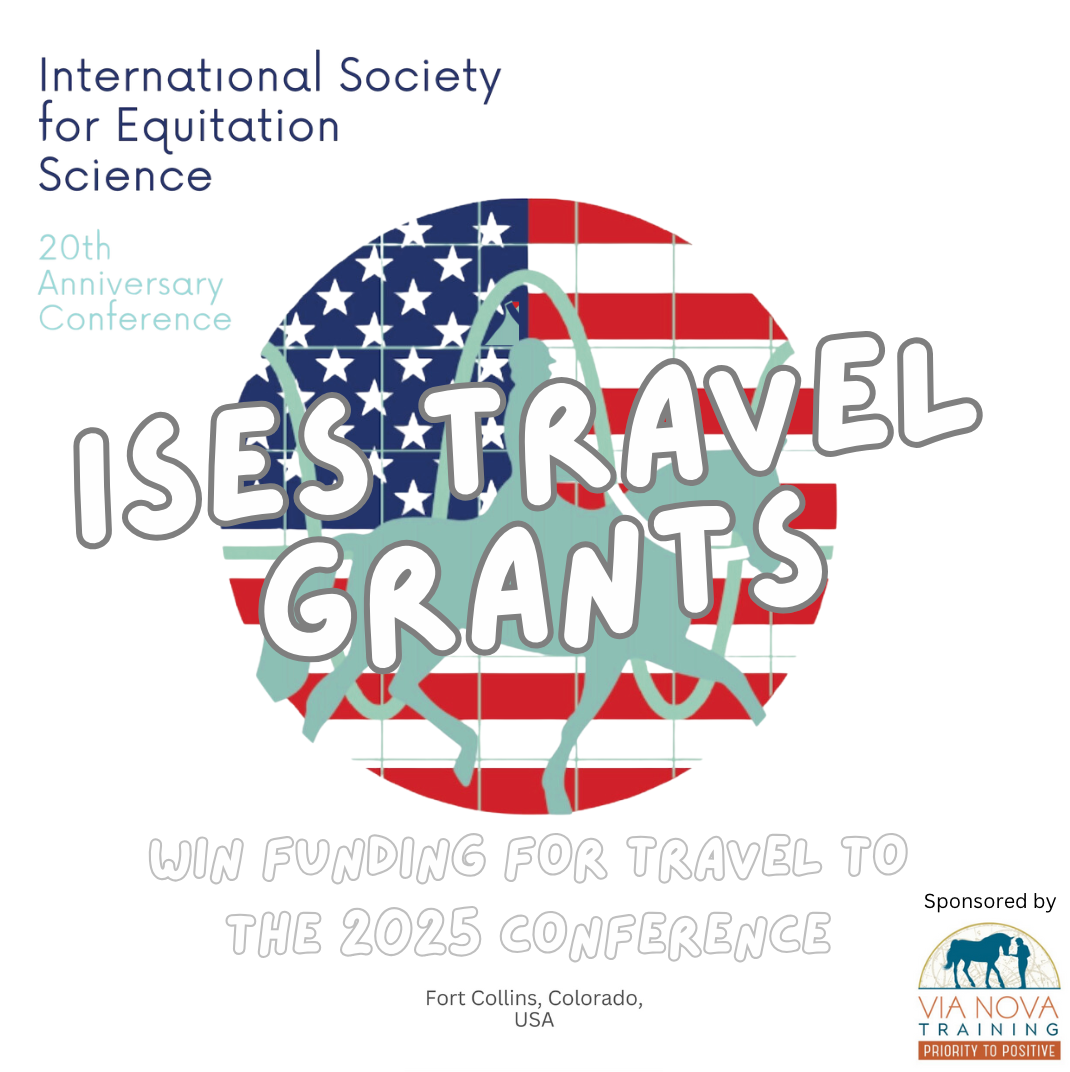
New webinar episode with Shawna Karrasch and Jessie Hillegas
This session explores the principles of positive reinforcement in horse training, focusing on how reward-based methods shape behavior and enhance learning. It will cover practical applications, ethical considerations, and the benefits of incorporating positive reinforcement into equine training.
Visit webinar page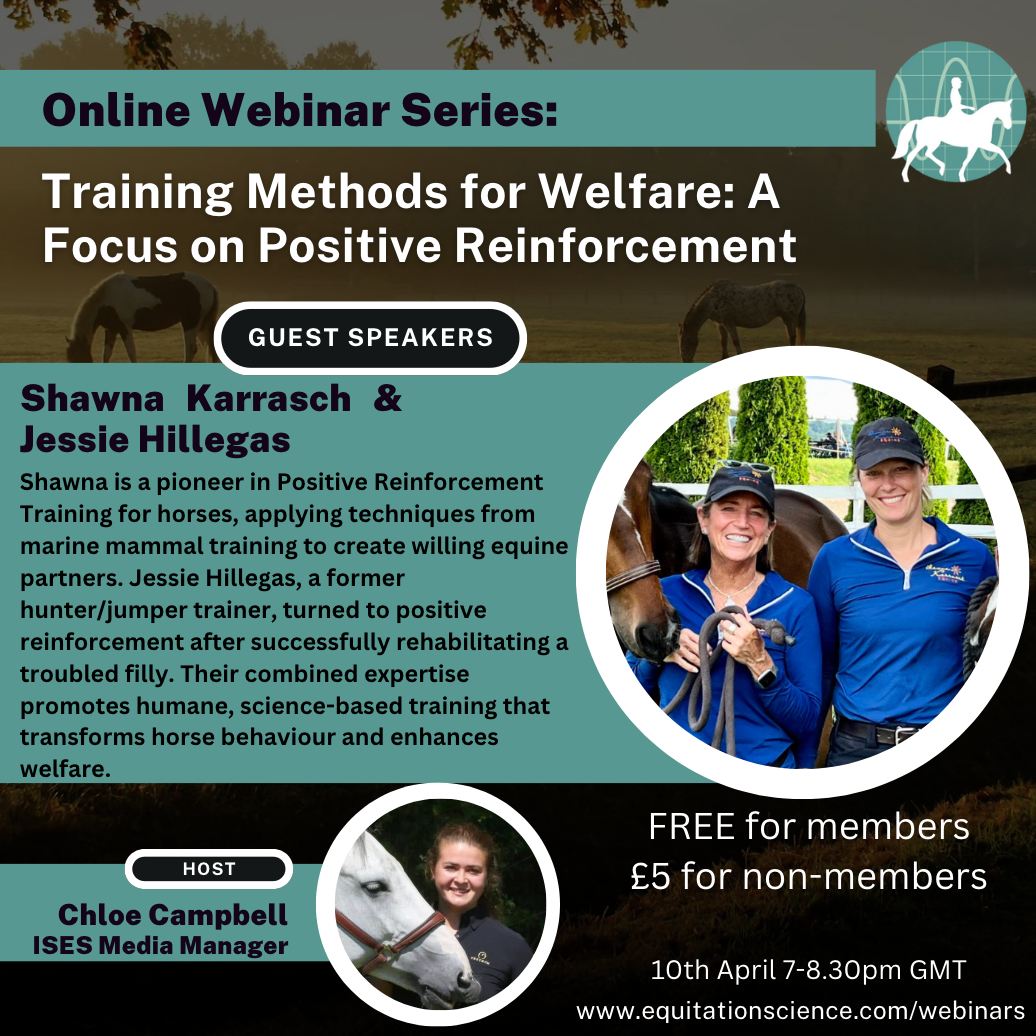
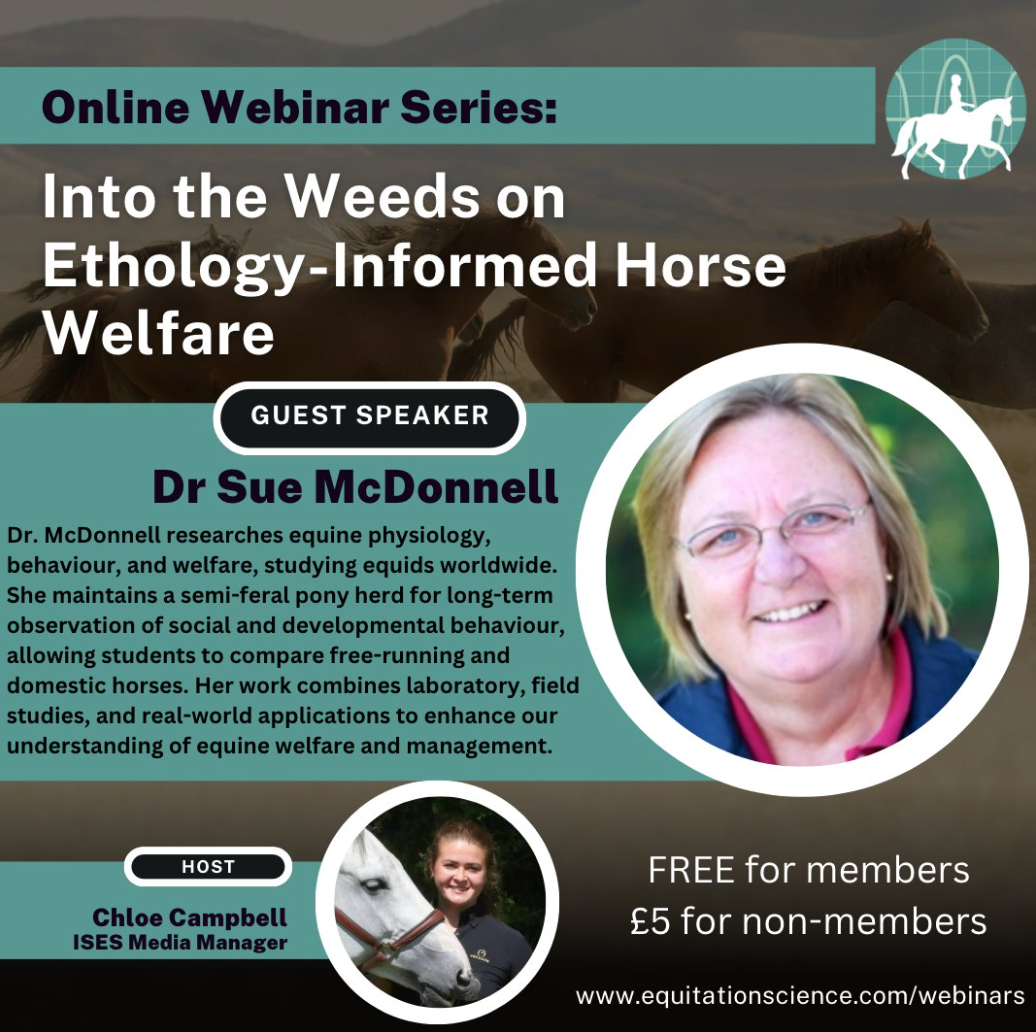
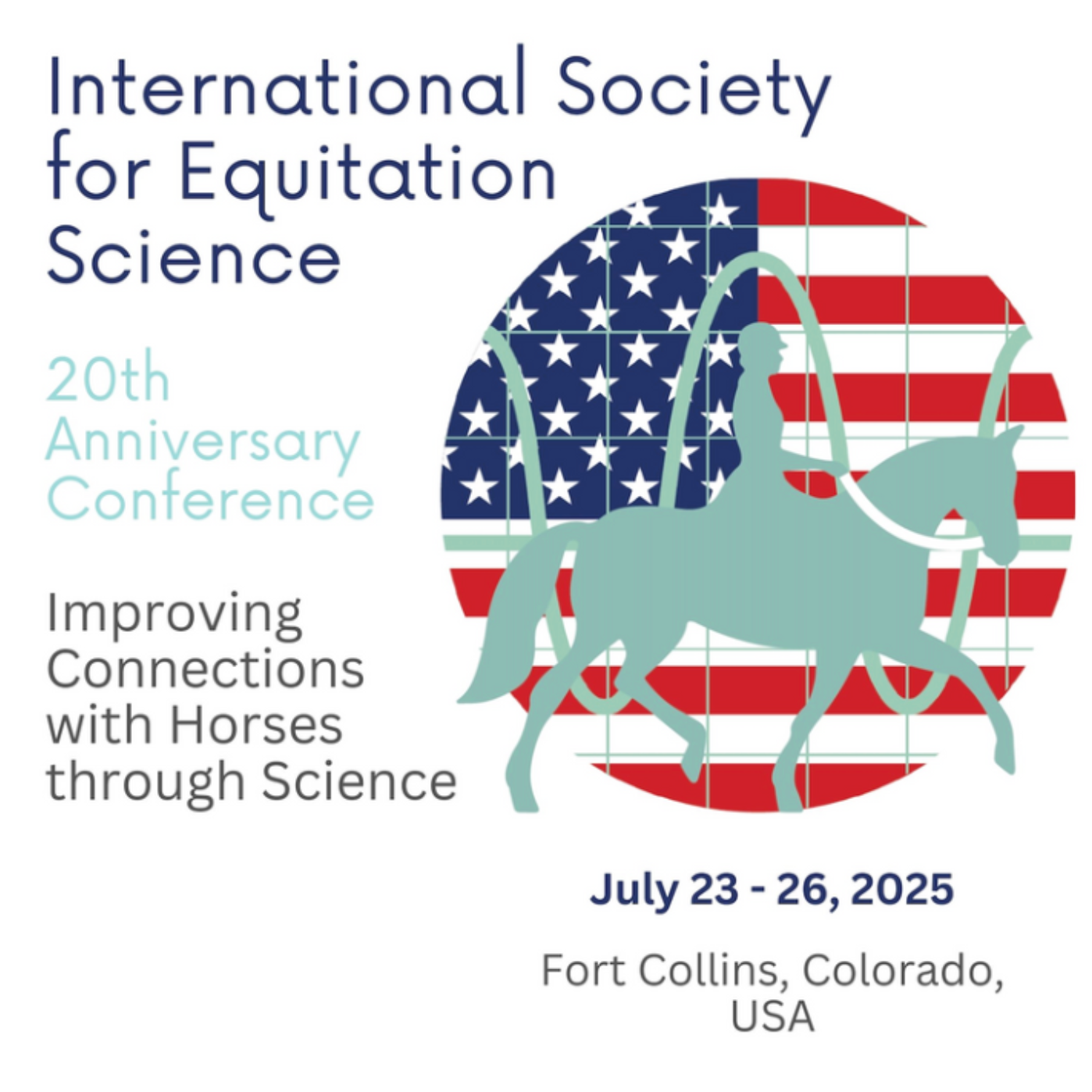


Webinar launch with Dr. Andrew Mclean
We are thrilled to announce the launch of our exciting new ISES Webinar, featuring Dr. Andrew McLean, as he shares the latest insights into Equitation Science. Hosted by Chloe Campbell, ISES Media Manager, this is your exclusive chance to dive into research, training methods, and practical applications for the care and training of horses.

New podcast episode
In this episode, Dr. Carol Hall discusses her PhD research with Dr. Rachel Kay on horse welfare, focusing on how horse-human interactions affect quality of life. She shares findings from her systematic review, which explores pain recognition, emotional reactivity, and handling, highlighting the importance of fulfilling horses' physical and social needs. Dr. Hall emphasises how positive interactions with humans can improve welfare, offering valuable insights into enhancing the lives of horses in sport and leisure activities.
Listen on our website or...

New podcast episode
In this episode, we’re thrilled to speak with Ella Bartlett, Dr. Jo Hockenhull, and Lorna Cameron about Ella’s PhD research: "Exploring the relationship between horse-owner attributes and their approach to horse training."

Meet the Author: Dr Gemma Pearson
Join us for an in-depth conversation with Dr. Gemma Pearson, a trailblazer in equine behavioral medicine and Director of Equine Behaviour at The Horse Trust. With her extensive experience as the first RCVS Specialist in Veterinary Behavioural Medicine (Equine) and her role leading a referral clinic at the University of Edinburgh, Dr. Pearson brings a wealth of knowledge on the science and art of equine behaviour.

New Danish translation for Training Principles
The ISES Training Principles provide a science-based approach to horse training and welfare. These principles are rooted in evidence-based practices and have been frequently referenced in peer-reviewed papers, articles, and scientific journals.
Researchers and equine professionals frequently point to these principles for their basis in learning theory, animal behaviour, and cognitive science.
There are currently 8 translations for the ISES Training Principles Posters! If you would like to help us translate into more languages, let us know!
Learn more

No Significant Difference Found Between 1.5 and 2 Finger Noseband Tightness in New Study, but FEI’s Precautionary Approach Praised
New study finds no significant difference in pressure between 1.5 and 2-finger noseband tightness, but FEI's 2-finger rule is praised for prioritising equine welfare. Researchers urge caution in interpreting findings from small samples and call for further research into behavioural impacts.
Read more
2025 conference date confirmed
The 20th International Society for Equitation Science Conference is back in the U.S. for the first time since 2013! Join inspiring researchers, practitioners, students, veterinary professionals, equine organizations, equine enthusiasts, and industry leaders from across the globe under the theme “Improving Connection with Horses through Science” at Colorado State University in Colorado, USA, July 23rd - July 26th, 2025.
Any updates will be announced via email and our social media, and soon, our website.

Tribute to Professor Frank Ödberg
As we honour Frank's remarkable contributions to the field of animal behaviour and welfare, we reflect on his passion, dedication, and lasting impact on both his students and the broader scientific community. His unwavering commitment to understanding and improving the lives of animals will be deeply missed.
Read more

